Pennsylvania Documents
Quitclaim Deed
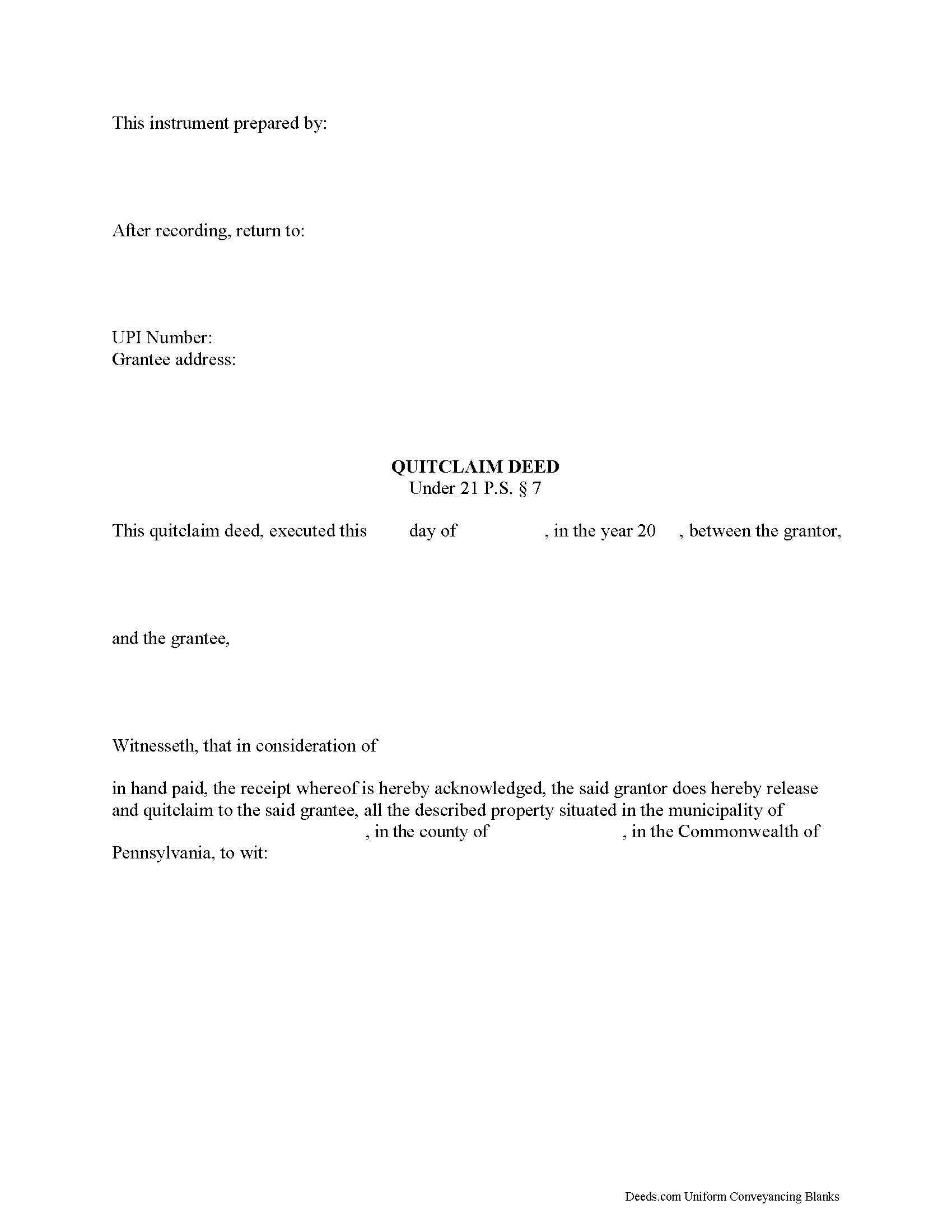
A quitclaim deed that is intended to release any land or interest in land in Pennsylvania should be signed and acknowledged by the parties executing it and recorded in the proper county. A Certificate of Residence that lists the grantee's name and address and is signed by the grantee must accompany the quitclaim deed presented for recording (PS 16-9781).
The legal effect of recording a quitclaim deed in Pennsylvania is to give constructive notice to subsequent purchasers, mortgagees, and/or judgment creditors of the parties to the conveyance (PS 21-357). In order for a quitclaim deed to provide constructive notice, at least one of the following conditions must be satisfied upon recording: the Uniform Parcel Identifier is included and it is indexed properly in an index arranged by parcel identifier numbers, or the quitclaim deed is indexed properly as to the party in all alphabetical indexes (PS 21-358). A deed that is not acknowledged or recorded is fraudulent and void to any subsequent bona fide purchaser or mortgagee or holder of any judgment, without actual or constructive notice unless such deed, conveyance, contract, or instrument of writing is recorded before the recording... More Information about the Pennsylvania Quitclaim Deed
Gift Deed
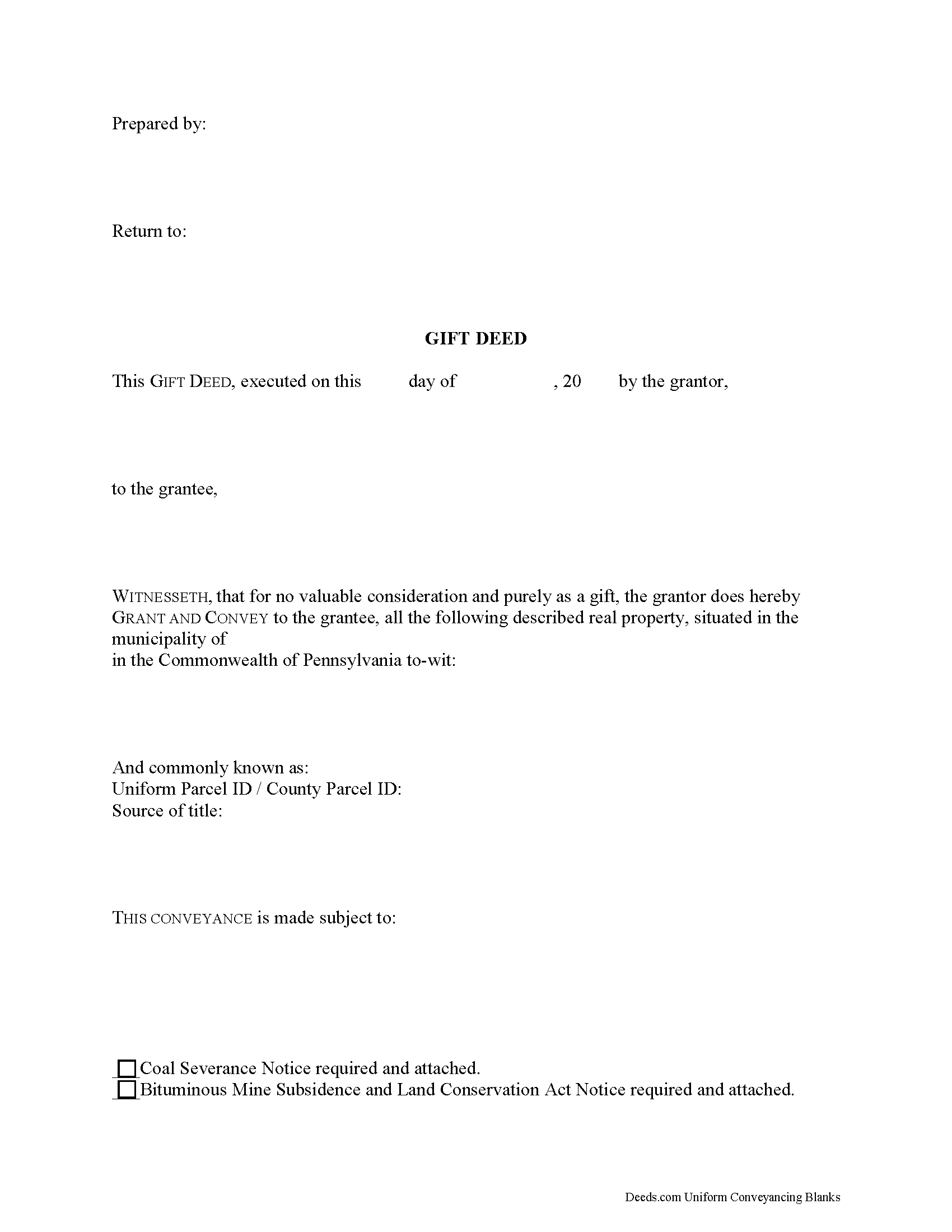
A gift deed, or deed of gift, is a legal document voluntarily transferring title to real property from one party (the grantor or donor) to another (the grantee or donee). A gift deed typically transfers real property between family or close friends. Gift deeds are also used to donate to a non-profit organization or charity. The deed serves as proof that the transfer is indeed a gift and without consideration (any conditions or form of compensation).
Valid deeds must meet the following requirements: The grantor must intend to make a present gift of the property, the grantor must deliver the property to the grantee, and the grantee must accept the gift. A gift deed must contain language that explicitly states no consideration is expected or required, because any ambiguity or reference to consideration can make the deed contestable in court. A promise to transfer ownership in the future is not a gift, and any deed that does not immediately transfer the interest in the property, or meet any of the aforementioned requirements, can be revoked [1].
A lawful gift deed includes the grantor's full name and marital status, as well as the grantee's full name, marital status, mailing add... More Information about the Pennsylvania Gift Deed
Warranty Deed
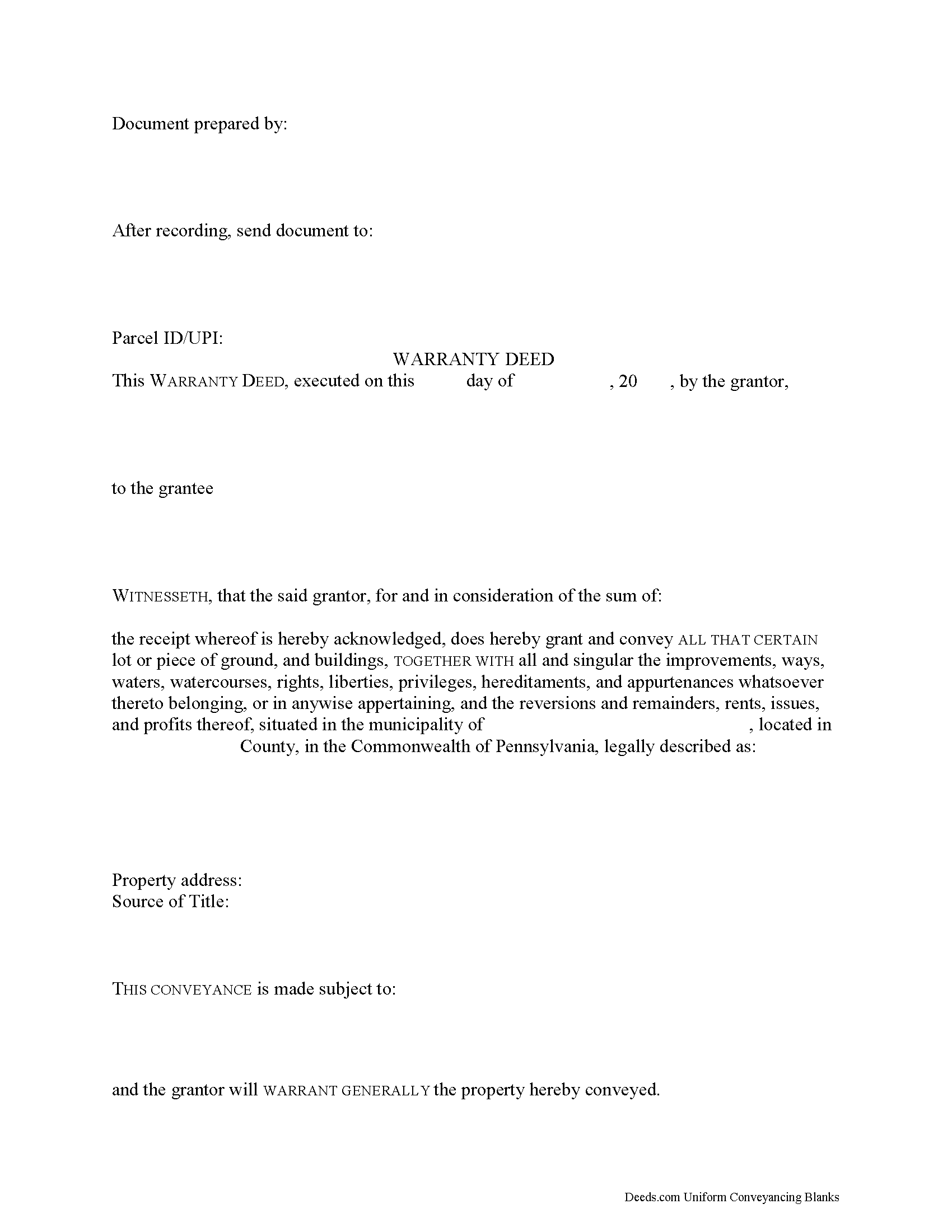
A warranty deed is a type of real estate deed that can be used to transfer title to real property in Pennsylvania. The statutory form for a conveyance of real property appears in 21 P.S. 1. A warranty deed is construed to include all the estate, right, title, interest, property, claim, and demand of the grantor, in law and in equity (21 P.S. 3). The words "grant and convey," or either one of said words when used in any conveyance of real estate will be judged an express covenant that the grantor was seized of an indefeasible estate in fee simple in the property conveyed, free from encumbrances done or suffered by the grantor, and also for quiet enjoyment against the grantor, his heirs, and assigns, unless limited by express words in the deed (21 P.S. 4). A covenant from the grantor that he will "warrant generally the property hereby conveyed" is construed to mean that the grantor covenants to the grantee that he will forever warrant and defend the said property, and every part thereof, unto the grantee, his heirs, personal representatives, and assigns against the lawful claims and demands of all persons (21 P.S. 5).
Before a warranty deed can be recorded in Pennsylvania, the... More Information about the Pennsylvania Warranty Deed
Special Warranty Deed
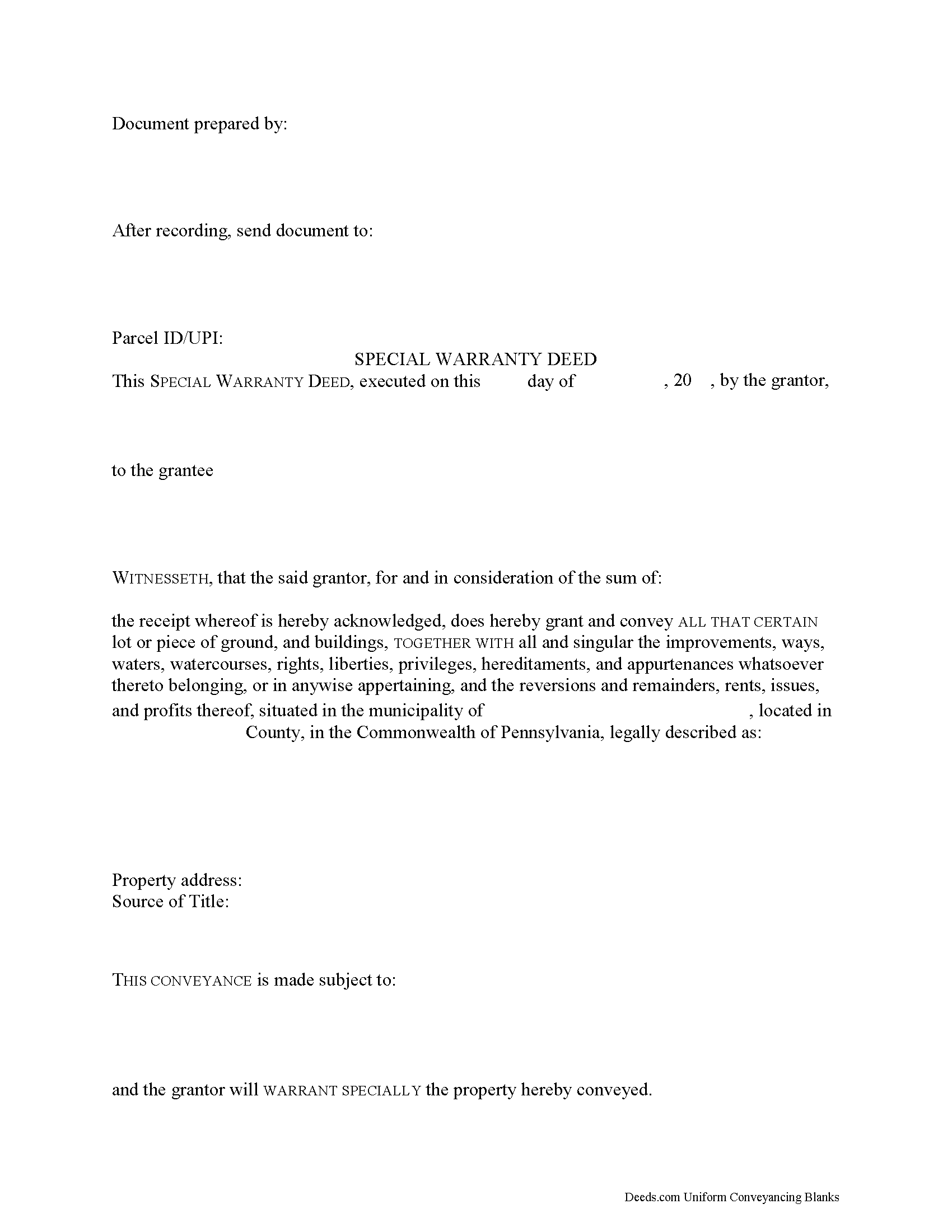
A real estate deed is used to transfer title to real property in Pennsylvania. The statutory form of a real estate deed is offered in 21 P.S. 1 and can be tailored for a special warranty deed. In a conveyance of real estate in this state, the words "grant and convey" or either one of those words will be effective to pass a fee simple title to the premises conveyed to the grantee, if the grantor possess such a title (21 P.S. 2). Further, the words "grant and convey" also imply the following covenants: That the grantor was seized of an indefeasible estate in fee simple of the property conveyed, free from encumbrances done or suffered by the grantor, and also for quiet enjoyment against the grantor, his heirs, and assigns, unless limited by express words in the deed (21 P.S. 4). A covenant from a grantor that he "will warrant specially the property hereby conveyed" will be construed to be a covenant from the grantor that he will warrant and forever defend the said property, and every part thereof, unto the said grantee, his heirs, personal representatives, and assigns against the lawful claims and demands of the grantor and all persons claiming or to claim by, through, or under the... More Information about the Pennsylvania Special Warranty Deed
Grant Deed
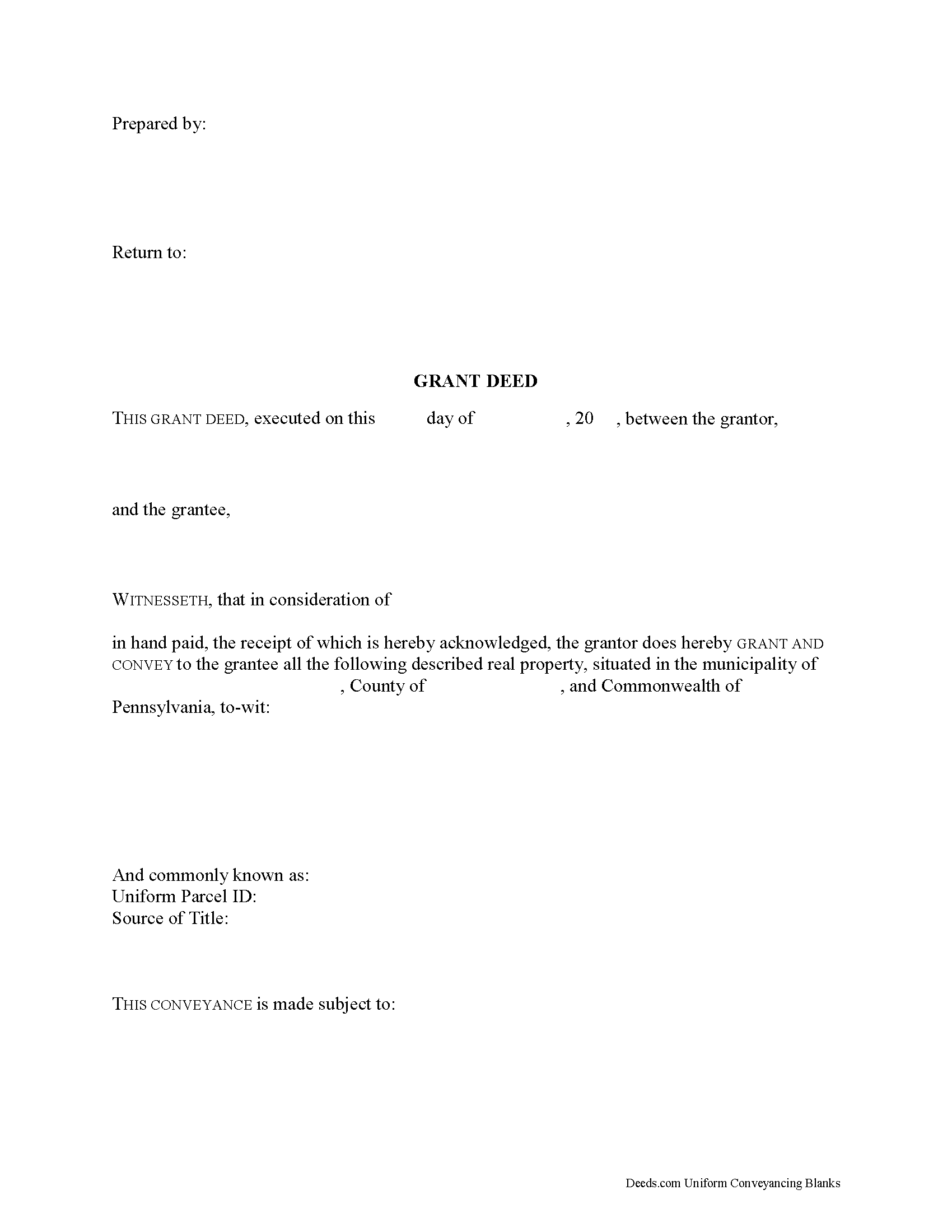
In Pennsylvania, title to real property can be transferred from one party to another by executing a grant deed, but the state does not include an official form in the statutes. Use a grant deed to transfer a fee simple interest with covenants that the title is free of any encumbrances (except for those stated in the deed) and that the grantor holds an interest in the property and is free to convey it. The word "grant" in the conveyancing clause typically signifies a grant deed.
A lawful grant deed includes the grantor's full name, mailing address, and marital status; the consideration given for the transfer; and the grantee's full name, mailing address, marital status, and vesting. Vesting describes how the grantee holds title to the property. Generally, real property is owned in either sole ownership or in co-ownership. For Pennsylvania residential property, the primary methods for holding title are tenancy in common, joint tenancy, and tenancy by entirety. A conveyance of real estate to two or more persons creates a tenancy in common, unless otherwise stated (68 Pa.C.S. Section 110). A tenancy by entirety is available for spouses, and must be explicitly stated. In Pennsylvania... More Information about the Pennsylvania Grant Deed
Correction Deed
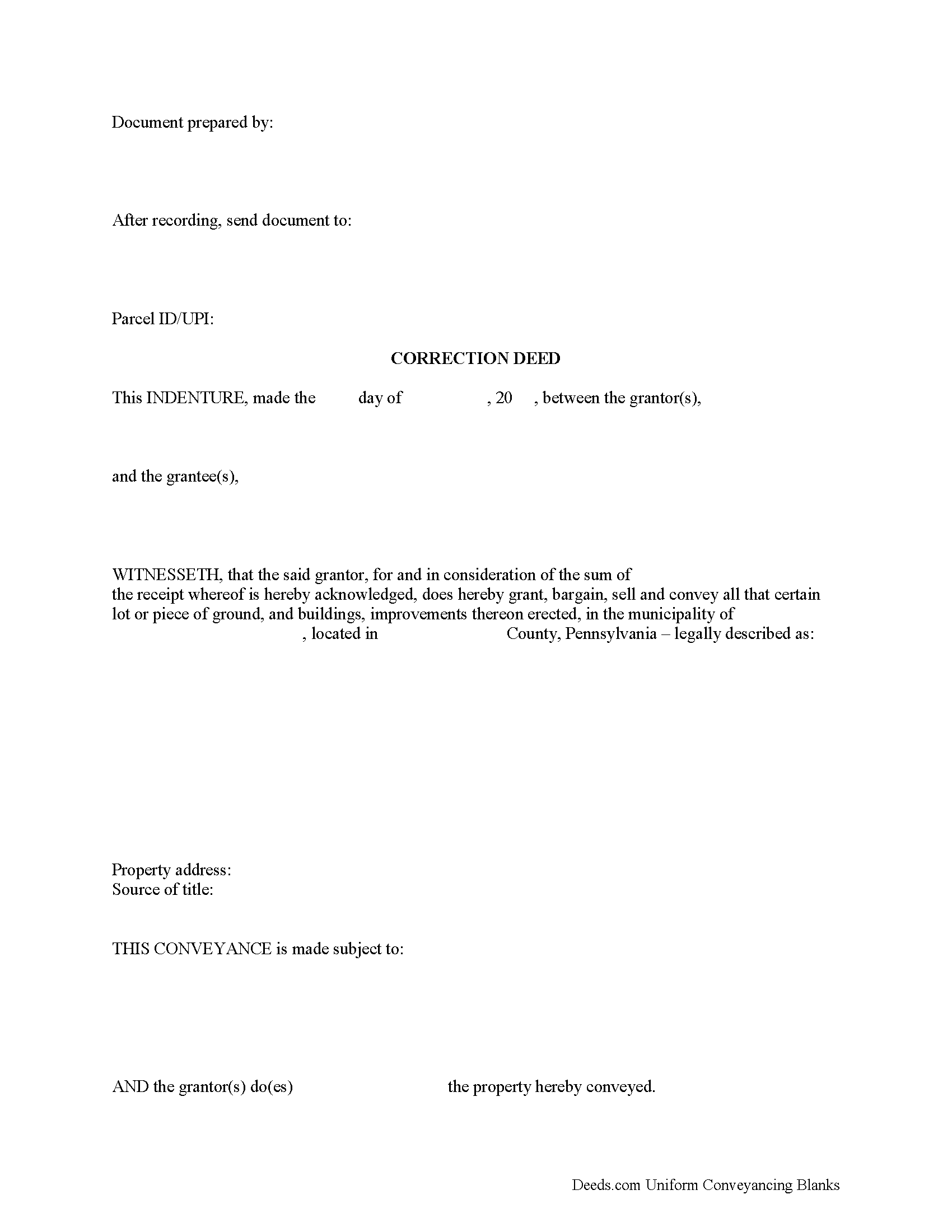
Correct common errors in a deed, such as typographical mistakes or omissions in various sections of the original deed, by using a corrective deed, which must be signed by the grantor or the grantee and re-acknowledged.
When correcting a deed in Pennsylvania, there are options: re-record the same document with corrections or record a corrective/confirmative deed. However, some counties insist on a new correction deed, others at least prefer one option over the other. So check with the local recorder to be sure. In either case, whether re-recording or recording, new recording fees are due.
In Pennsylvania, the new correction deed can also be issued from the grantee to him- or herself, who after all is the current title holder for the property. This may be more convenient and is especially advisable in the case of a minor error. However, if the correction affects the legal description of the property, have the grantor re-acknowledge the new deed. Some counties require the grantor's signature regardless of the mistake in question. So check with the local office before issuing the correction deed.
Whether re-recording the old deed or recording a new correction instrument, both... More Information about the Pennsylvania Correction Deed
Easement Deed
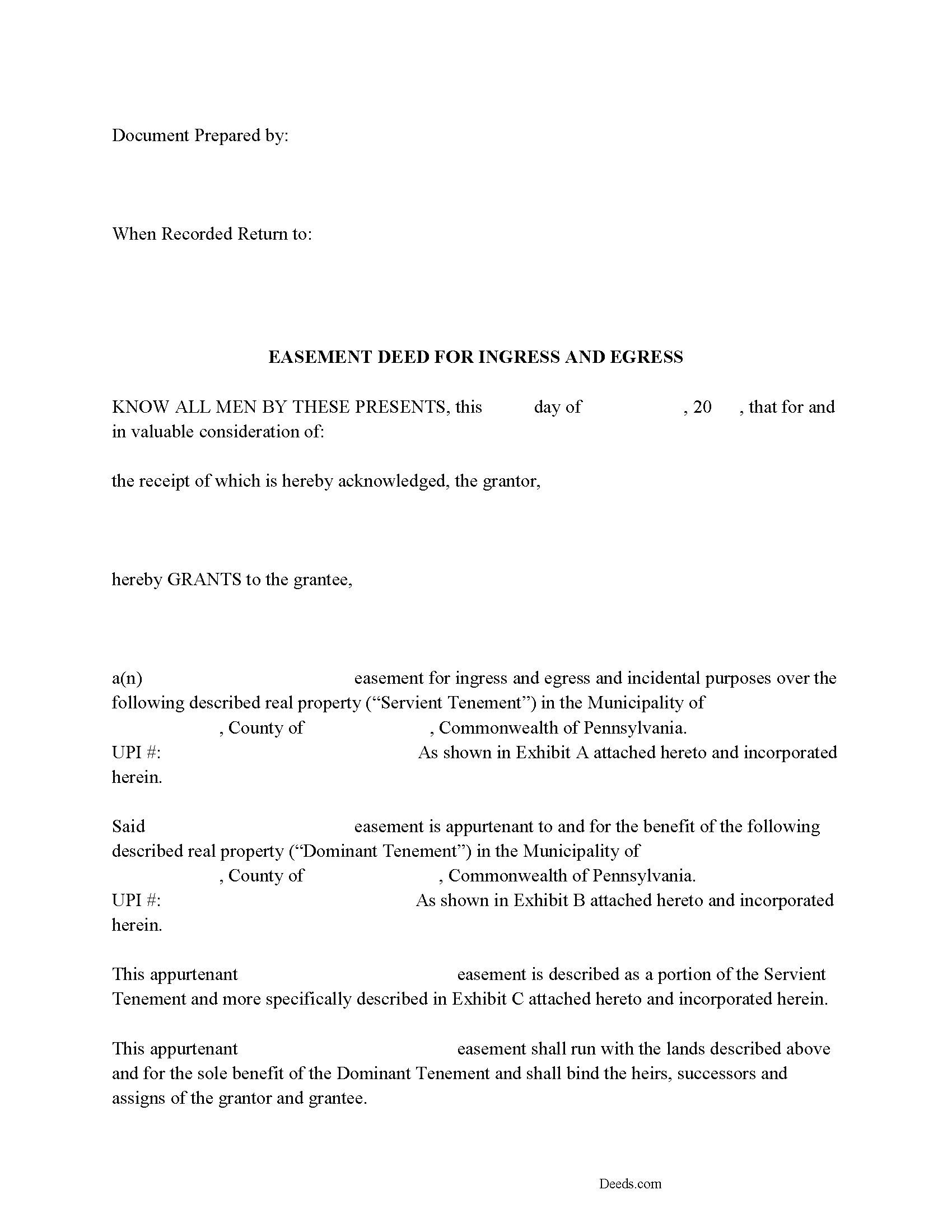
An easement is defined as a non-possessory right to use another's land for a specific and precise purpose that is not inconsistent with the other's simultaneous right to use the same property. Often, an easement is contained in the body of a deed providing for the outright conveyance of a parcel of real estate. A Pennsylvania easement can also be created by a written and signed agreement or by a deed of easement. The easement deed should specify the terms and duration of the easement.
The Pennsylvania Statute of Frauds requires that any transfer of an interest in real estate, including a grant of easement, be in writing and duly signed in order to be binding (33 P.S. 1). Before an easement deed can be recorded it must be acknowledged by the grantor. Acknowledgments in Pennsylvania may be made before a before a judge of a court of record, a clerk or deputy clerk of a court having seal, a recorder of deeds, a notary public, or a justice of the peace (21 P.S. 291.2). An easement deed acknowledged out-of-state will be valid to record in Pennsylvania if it complies with the laws of such place where acknowledgments were taken (21 P.S. 41). A certificate of acknowledgment by an off... More Information about the Pennsylvania Easement Deed
Termination of Easement
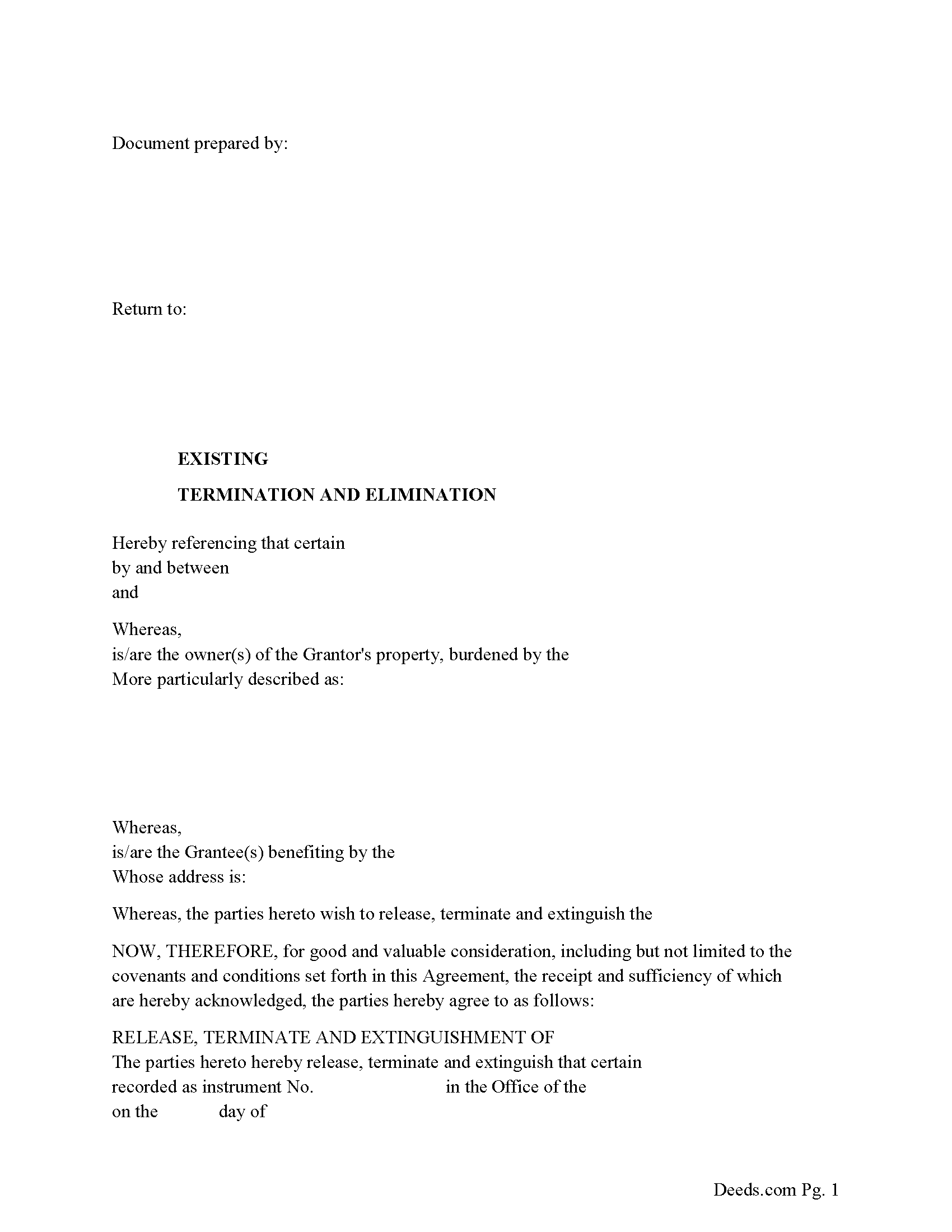
Use this form to release, terminate, extinguish a previously recorded document that involves access to and from a property.
Documents such as:
1. Easement Deeds or Agreements (An easement is a non-possessory interest in land, granting the right to use someone else's property for a specific purpose, like a driveway or utility line)
2. Access Roads
3. Right of Ways
4. Utility Easements (Power, Gas, Water, Sewer, Etc.)
5. Drainage Easements
This document allows the owner of the land, burdened by the access and the party that benefits from the access, to sign an agreement releasing the property from such access, ... More Information about the Pennsylvania Termination of Easement
Affidavit of Surviving Spouse
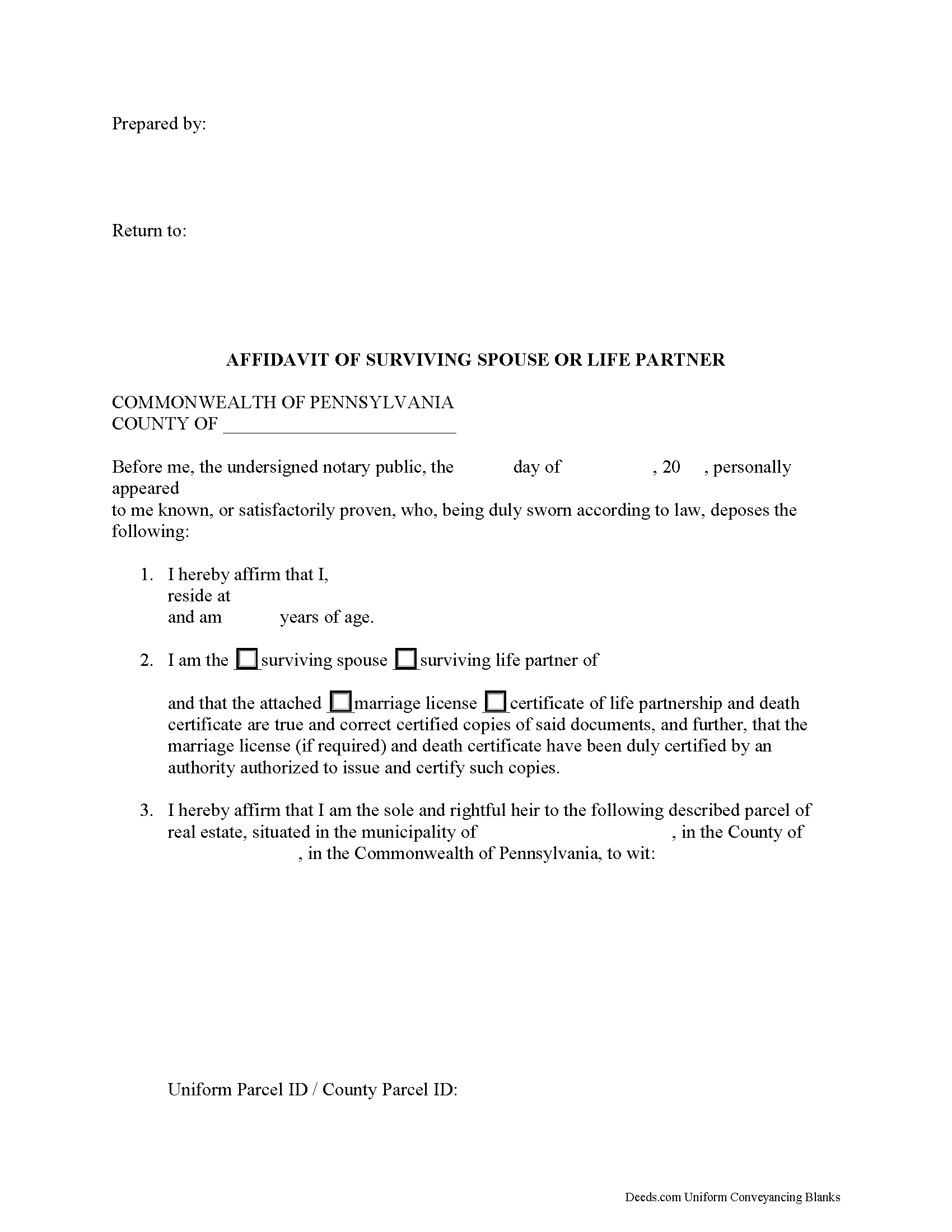
Using an Affidavit of Surviving Spouse or Life Partner in Pennsylvania
The manner of vesting, or the way owners hold title to real property, determines what will happen to that property in the event of their death.
The three options available to co-owners vesting residential real property in Pennsylvania are tenancy in common, joint tenancy, and tenancy by the entirety. A tenancy in common and a joint tenancy are available to two or more owners, whereas a tenancy by the entirety is available only to married couples.
When co-owners vest as tenants in common, each one owns a separate share of the title. A joint tenancy with the right of survivorship means that, upon the death of one joint tenant, the deceased's interest in the property is proportionately distributed to the remaining joint tenants, thus avoiding probate. In tenancy by entirety, both spouses share 100% undivided ownership of the property. Similar to joint tenancy, when the first spouse dies, his or her interest in the property ceases, meaning the surviving spouse becomes the sole owner.
Pennsylvania property held in either a joint tenancy or a tenancy by the entirety vests automatically in the survivor(s) ... More Information about the Pennsylvania Affidavit of Surviving Spouse
Trustee Deed
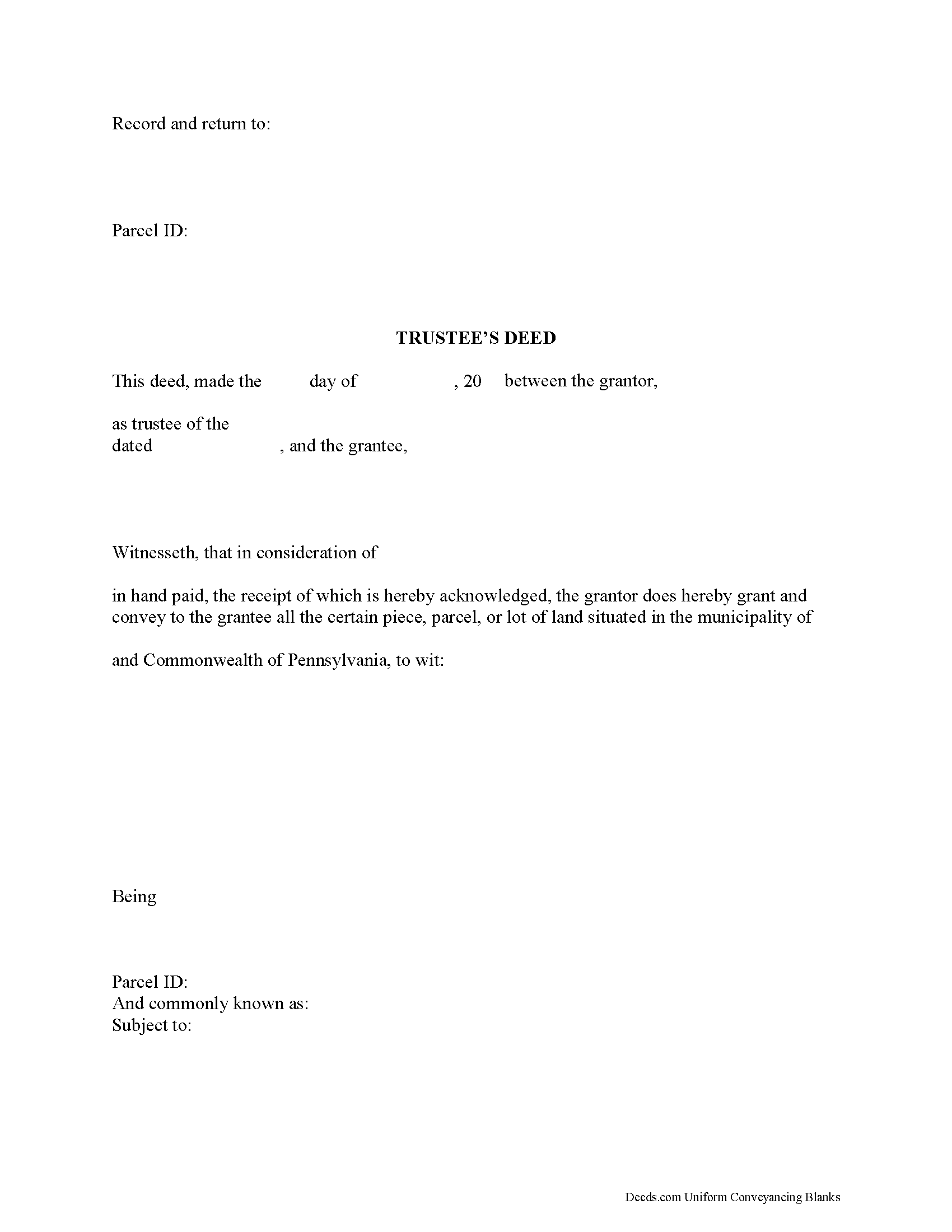
Title 20, Chapter 77 of the Pennsylvania Statutes governs trusts in the State of Pennsylvania.
A trust is a wealth management tool commonly used in estate planning. There are three main parties to a trust: the settlor, who funds the trust by conveying assets into it; the trustee, who administers the trust and controls its assets; and the beneficiary, who has a present or future interest in the trust (P.S. 7703). Note that a sole trustee cannot also be the sole beneficiary (P.S. 7732(a)(5)).
Under a trust, the acting trustee manages the trust as directed by the settlor. This arrangement works, in part, because the trustee holds what amounts to a proxy title to the trust's assets. If the trust contains real property that the settlor wishes to sell, the trustee executes and records a document called a trustee's deed to transfer the title to the grantee/buyer -- the settlor is not identified in the transaction.
In most cases, trustee's deeds are modified quitclaim or special warranty deeds. Quitclaim deeds contain no warranties of title, and special warranty deeds only offer the grantee protection against title claims originating while grantor controlled the property. Gener... More Information about the Pennsylvania Trustee Deed
Personal Representative Deed
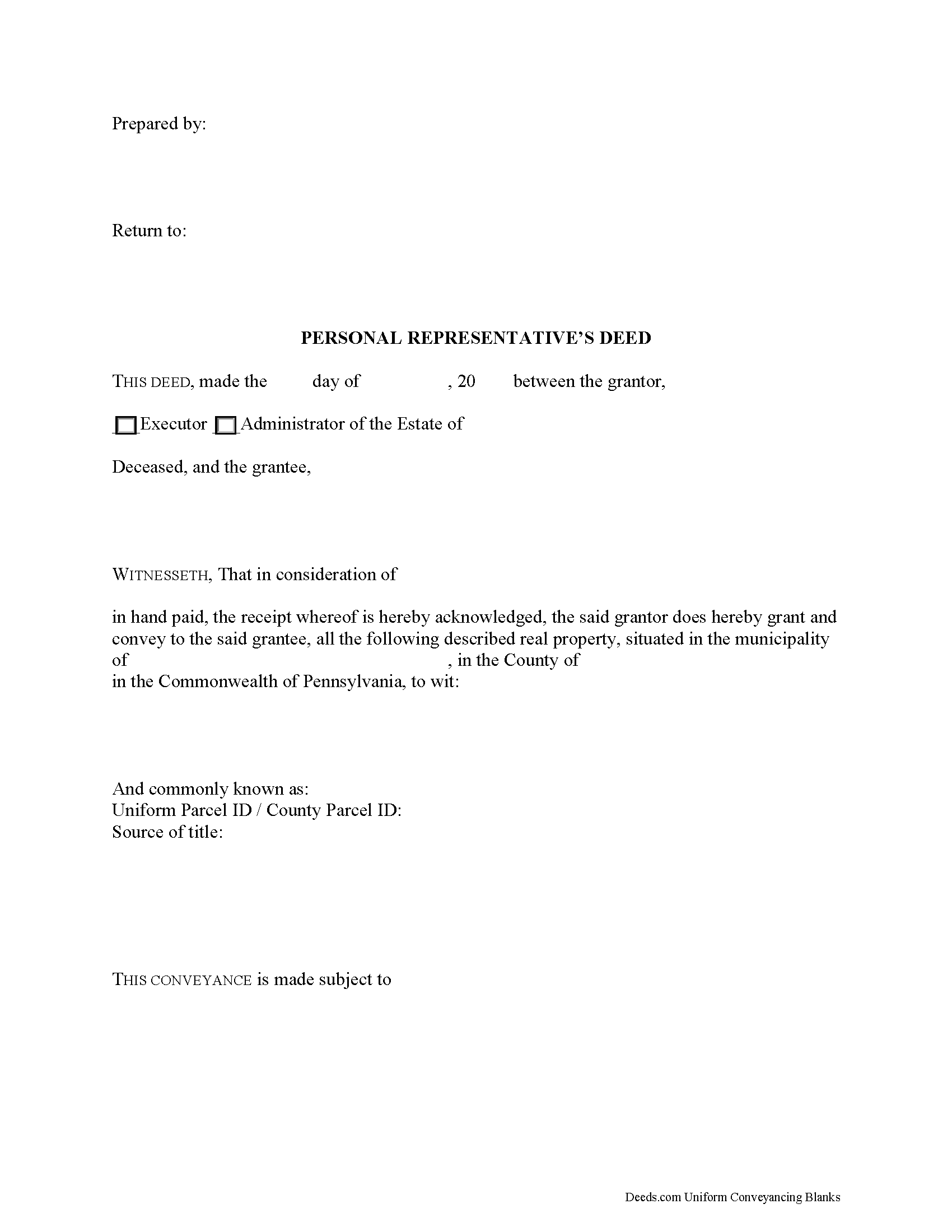
Using a Personal Representative's Deed in Pennsylvania
--
The information provided in this article is not meant to be exhaustive, and should not take the place of legal advice. We strongly recommend consulting a lawyer when administering an estate, as each situation is unique. Personal representatives have a fiduciary duty to serve in the estate's best interests, and are "personally liable for undue mistakes made in the administration of the decedent's estate" [1].
--
When Pennsylvania residents die, their estate is admitted to probate, regardless of whether they left a will. A will is a legal document whereby a person (testator) gives directions for the distribution of personal assets upon death, and identifies who will administer the estate. Probate is the legal process of distributing assets. In the Commonwealth of Pennsylvania, this process, also referred to as estate administration, is governed by Title 20 et seq. of the Pennsylvania Code (Decedents, Estates, and Fiduciaries).
A probate case begins with the Register of Wills for the county where the deceased claimed permanent residence. Those with property situated in two or more counties also require ancillary probate ... More Information about the Pennsylvania Personal Representative Deed
Mortgage Instrument and Promissory Note
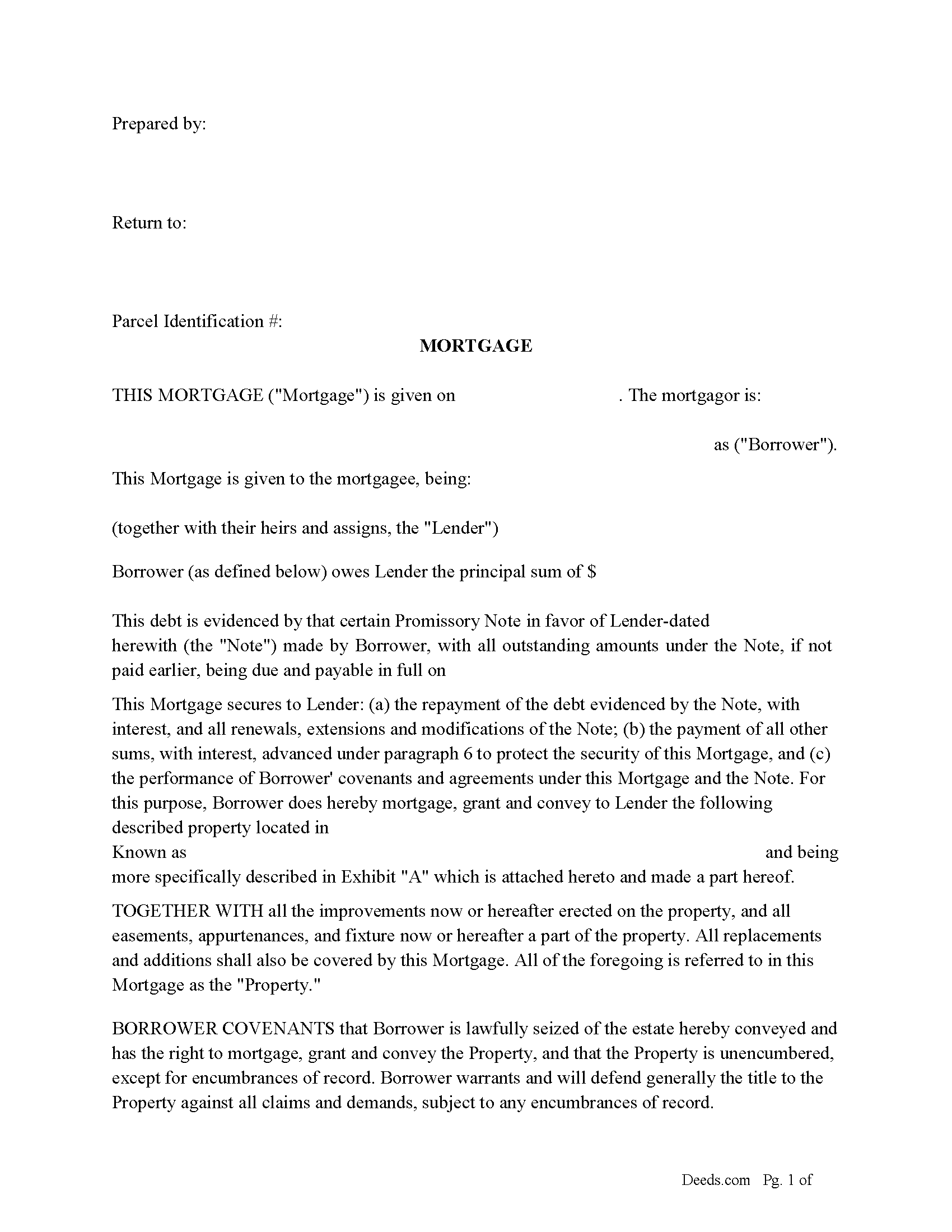
This is a recordable Mortgage secured by a Promissory Note, used to finance real property - residential, small commercial, rental, vacant land, condominiums and planned unit developments. In general, a Pennsylvania mortgage must be recorded within six months, see Section 621 Mortgages to be recorded within six months.
(All mortgages or defeasible deeds in the nature of mortgages shall have priority according to the date of recording the same, without regard to the time of making or executing such deeds; and it shall be the duty of the recorder to endorse the time upon the mortgages.) (Section 622 - Priority according to date of recording)
Included is the required Certificate of Residence. (For the purpose of obtaining with accuracy the precise residence of all mortgagees, assignees, and persons to whom interest is payable on articles of agreement, it shall be the duty of the recorder of deeds in each county, whenever a mortgage, assignment, or agreement given to secure the payment of money, shall be presented to him for record, to refuse the same, unless the said mortgage, assignment, or agreement has attached thereto, and made part of said mortgage, assignment, or agreement, ... More Information about the Pennsylvania Mortgage Instrument and Promissory Note
Satisfaction of Mortgage
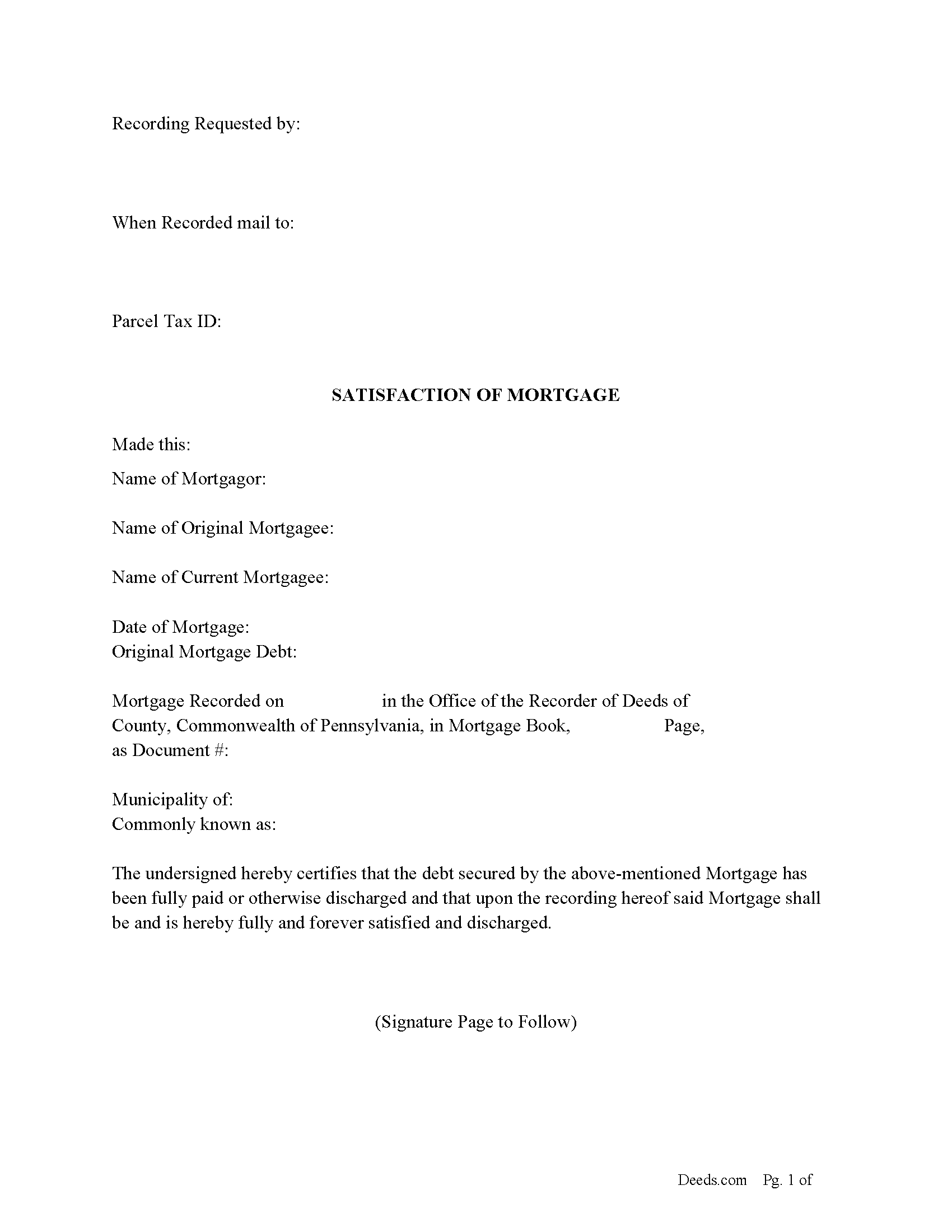
The Mortgagee/Lender generally has 60 days to record a satisfaction to avoid penalty.
((1)If, within 60 days of the mortgagee's receipt of:
(i)payment of the entire mortgage obligation and all required satisfaction and recording costs; and
(ii)the first written request by the mortgagor for the satisfaction piece delivered and in substantially the form described in this section,
the mortgagee fails to present for recording to the office where the mortgage was recorded a satisfaction piece as described in section 5-1 or the mortgage is not otherwise satisfied, the mortgagee shall forfeit and pay to the mortgagor a penalty in a sum not exceeding the original loan amount.
(2)In any successful action to recover penalties pursuant to this section, the mortgagee shall reimburse the mortgagor for costs of the action, including the mortgagor's reasonable attorney fees.
(3)Any action to enforce the provisions of this section, including any action to recover amounts due under this section, shall be brought and maintained in the individual names and shall be prosecuted by persons entitled to recover under the terms hereof and not in a representative capacity.
(4)An action... More Information about the Pennsylvania Satisfaction of Mortgage
Assignment of Mortgage
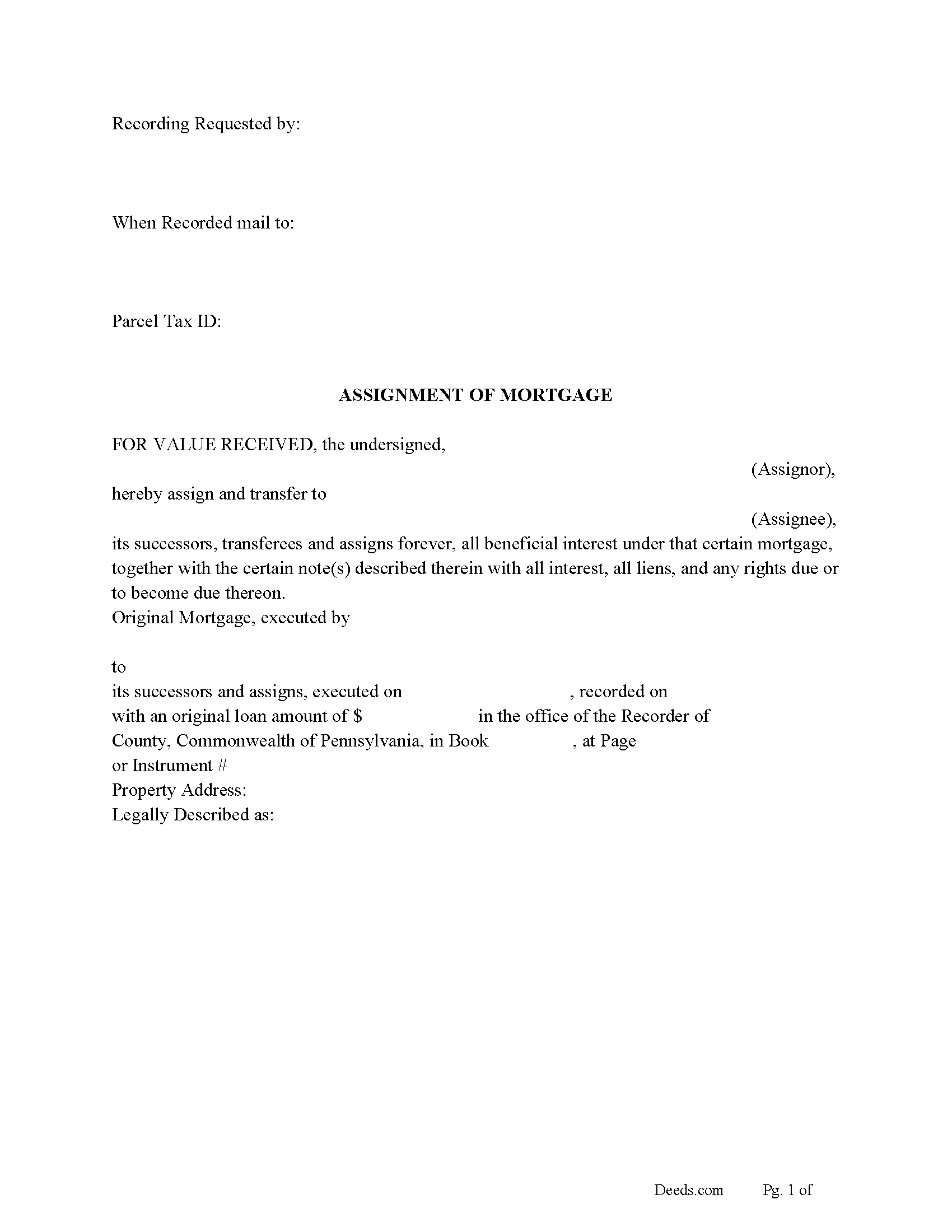
Use this form to assign all beneficial interests in a previously recorded Mortgage document.
An Assignment of Mortgage (to be in writing) (and acknowledged by the assignor or assignors before an officer or person duly authorized to take such acknowledgments.)
(Title 21 P.S. Deeds and Mortgages 623-1.)
Included is the required - Certificate of Residence of Assignee
(For the purpose of obtaining with accuracy the precise residence of all mortgagees, assignees, and persons to whom interest is payable on articles of agreement, it shall be the duty of the recorder of deeds in each county, whenever a mortgage, assignment, or agreement given to secure the payment of money, shall be presented to him for record, to refuse the same, unless the said mortgage, assignment, or agreement has attached thereto, and made part of said mortgage, assignment, or agreement, a certificate signed by said mortgagee, assignee, or person entitled to interest, or his, her or their duly authorized attorney or agent, setting forth the precise residence of such mortgagee, assignee, or person entitled to interest; said certificate to be recorded with said mortgage, assignment, or agreement; and therefrom... More Information about the Pennsylvania Assignment of Mortgage
Memorandum and Notice of Agreement
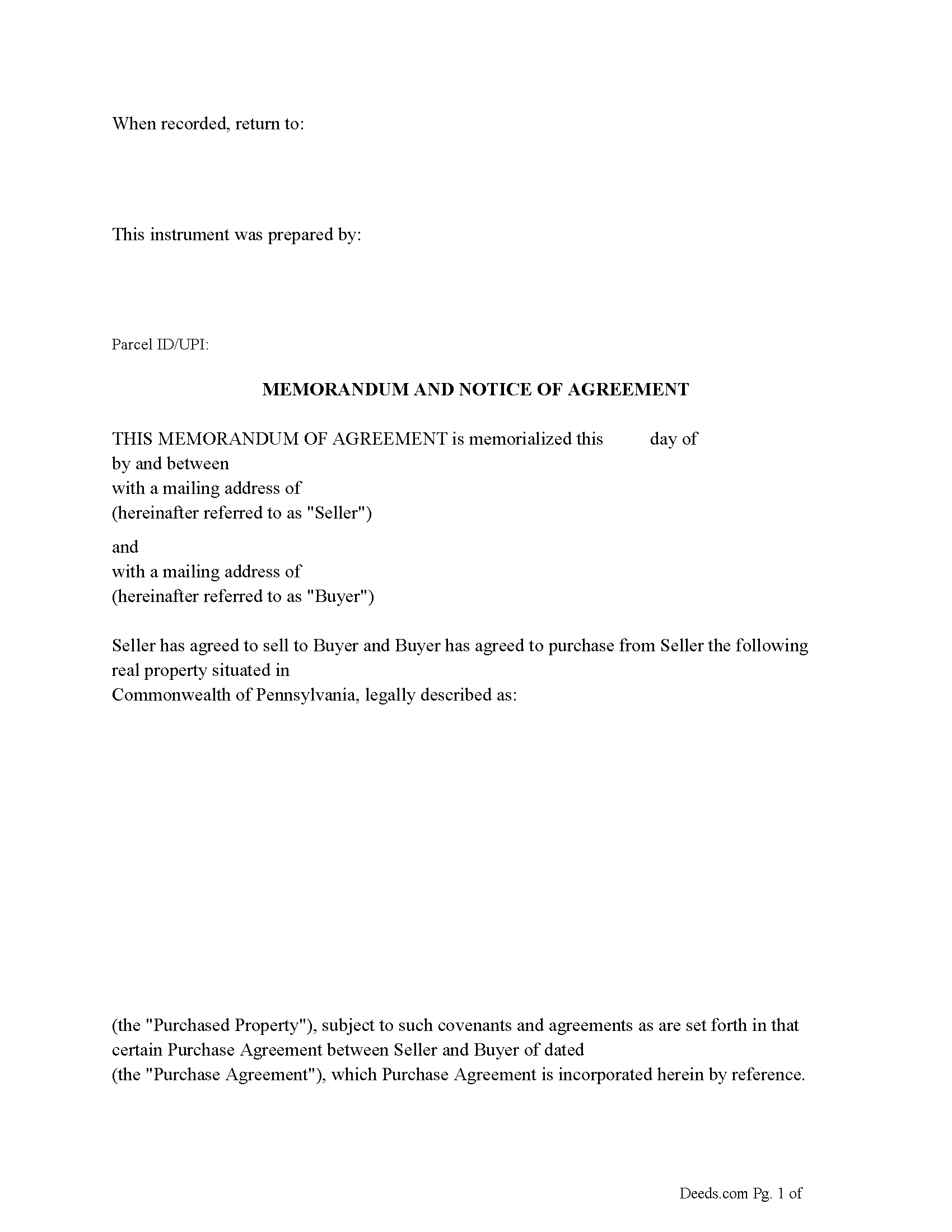
A "Memorandum of Purchase Agreement" commonly referred to as a "Memorandum of Agreement" (MOA) or "Memorandum of Understanding" (MOU) in the context of real estate, is used primarily as a means to provide public notice of an equitable interest in a real estate transaction without disclosing the full details of the purchase agreement. This document is particularly useful in transactions where the buyer and seller have agreed to terms but the final closing and transfer of the deed have not yet occurred. By recording this memorandum with the county recorder's office, the buyer establishes a public record of their interest in the property, which can protect against subsequent claims or liens by third parties.
Key Purposes of a Memorandum of Purchase Agreement:
1. Notice of Equitable Interest: The memorandum serves as notice to the public that the buyer has an equitable interest in the property due to the purchase agreement. This is important in protecting the buyer’s interest against claims by other parties who might otherwise be unaware of the agreement.
2. Protection During the Closing Process: Real estate transactions can involve a lengthy closing process, including financ... More Information about the Pennsylvania Memorandum and Notice of Agreement
Mineral Deed
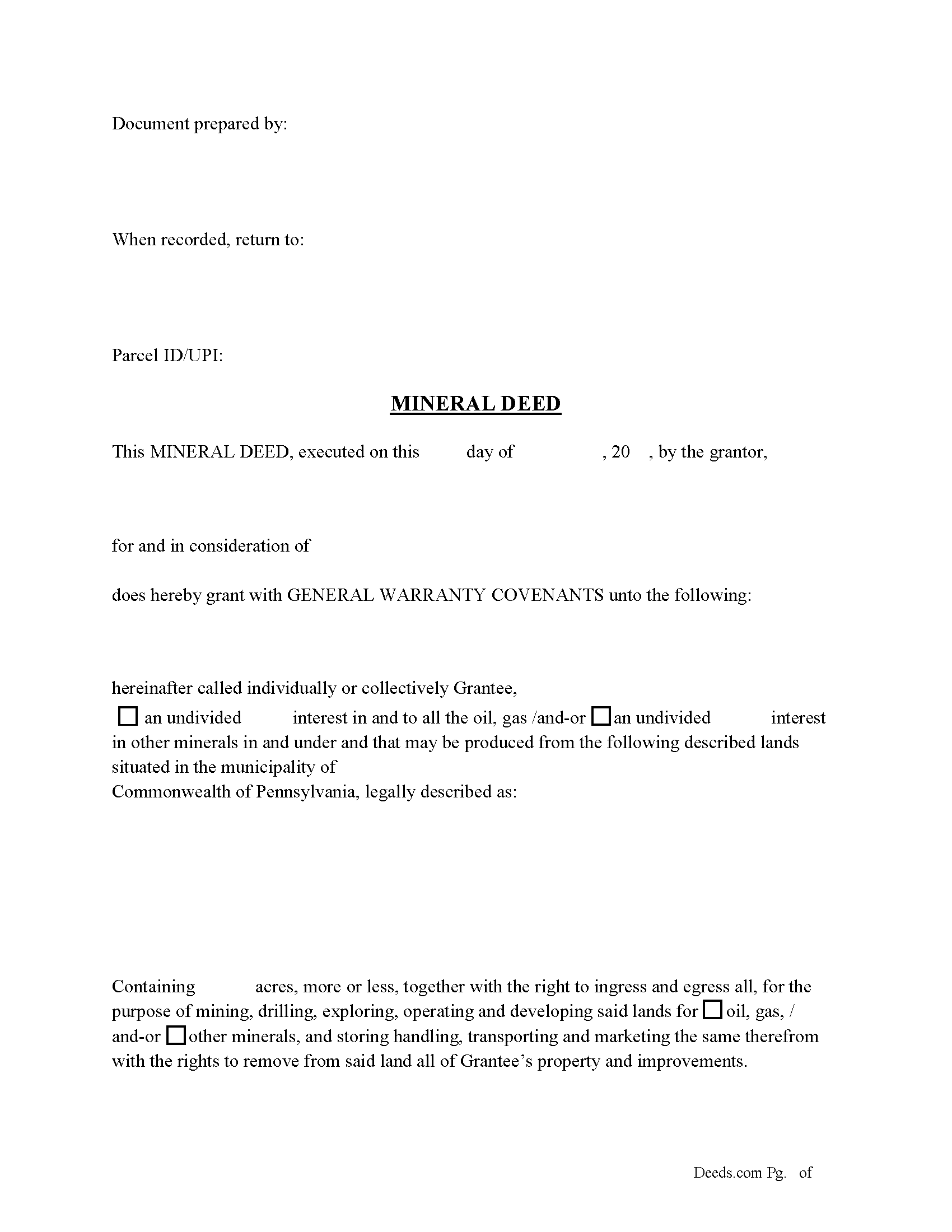
The General Mineral Deed in Pennsylvania has the option to transfers ALL oil, gas, AND-OR other mineral rights from the grantor to the grantee. THIS IS NOT A LEASE. There are no Exceptions or Reservations included.
The transfer includes the oil, gas and other minerals of every kind and nature. It also transfers any and all rights to receive royalties, overriding royalties, net profits interests or other payments out of or with respect to those oil, gas and other minerals. The Grantor can stipulate the percentage of Mineral Rights the Grantee will receive and is made subject to any rights existing under any valid and subsisting oil and gas lease or leases of record.
This general mineral deed gives the grantee the right to access, for the purpose of mining, drilling, exploring, operating and developing said lands for oil, gas, and other minerals, and storing handling, transporting and marketing of such.
In this document the Grantor Warrants and will defend said Title to Grantee. Use of this document has a permanent effect on your rights to the property, if you are not completely sure of what you are executing seek the advice of a legal professional.
(Mineral Deed Package ... More Information about the Pennsylvania Mineral Deed
Quitclaim Mineral Deed
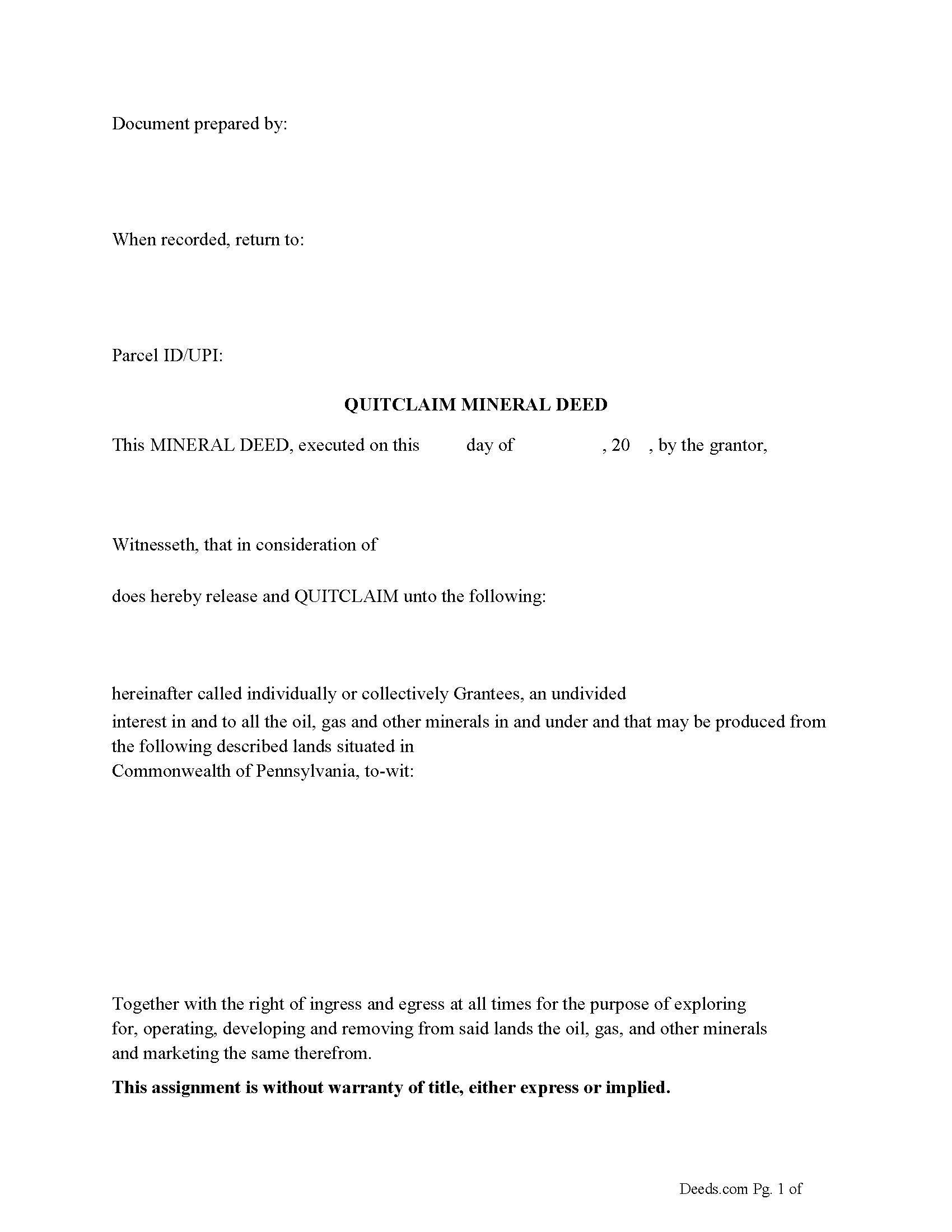
The General Mineral Deed in Pennsylvania Quitclaims oil, gas, and mineral rights from the grantor to the grantee. THIS IS NOT A LEASE. There are no Exceptions or Reservations included.
The transfer includes the oil, gas and other minerals of every kind and nature. The Grantor can stipulate the percentage of Mineral Rights the Grantee will receive.
This general mineral deed gives the grantee the right to access, for the purpose of mining, drilling, exploring, operating and developing said lands for oil, gas, and other minerals, and storing handling, transporting and marketing of such.
The seller, or grantor Quitclaims the mineral rights and does NOT accept responsibility to any discrepancy of title (This assignment is without warranty of title, either express or implied)
Uses: Mineral deeds with quitclaim are often used in situations where the grantor wants to quickly release any interest they might have in mineral rights, such as in settling estates, resolving disputes, clearing up uncertainties about ownership in a title's history or when mineral rights have previously been severed or fragmented from surface rights and cloud a title, making it difficult to transfer pro... More Information about the Pennsylvania Quitclaim Mineral Deed
Notice of Commencement
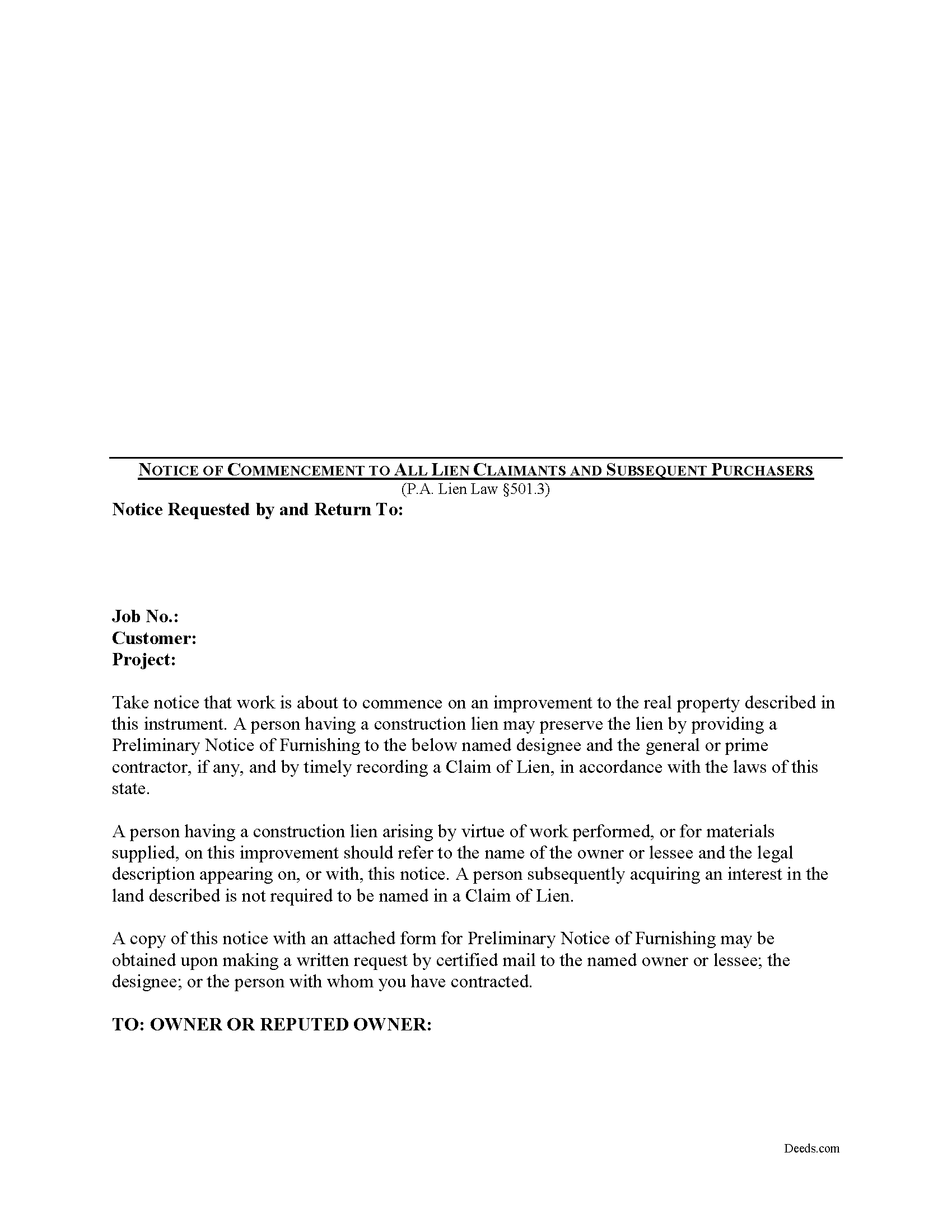
As a Pennsylvania property owner, should I file a Notice of Commencement?
Mechanic's Liens are governed by Title 49 of the Pennsylvania Consolidated Statutes.
In Pennsylvania, an owner may file an OPTIONAL Notice of Commencement with the Directory of General Services (DGS) registry. The purpose of filing the Notice of Commencement is to provide all the relevant information necessary for a subcontractor or supplier to file a Notice of Furnishing. 501.3.
Prior to the commencement of labor or the furnishing of materials for a searchable project that may give rise to a mechanics' lien under the mechanic's lien code, the searchable project owner or agent of the searchable project owner may file a Notice of Commencement with the directory. 501.3(a)(1). The contractor can also act as the owner's agent and file the Notice of Commencement if the contract provides. 501.3(a)(2).
Filing a Notice of Commencement triggers the requirement for a subcontractor or supplier on the job to serve you with a Notice of Furnishing within 45 days. 501.3(b)(1).
Section 501.3(a)(3) states that the Notice of Commencement must include the following information:
1) Name, street address, and e-ma... More Information about the Pennsylvania Notice of Commencement
Notice of Furnishing
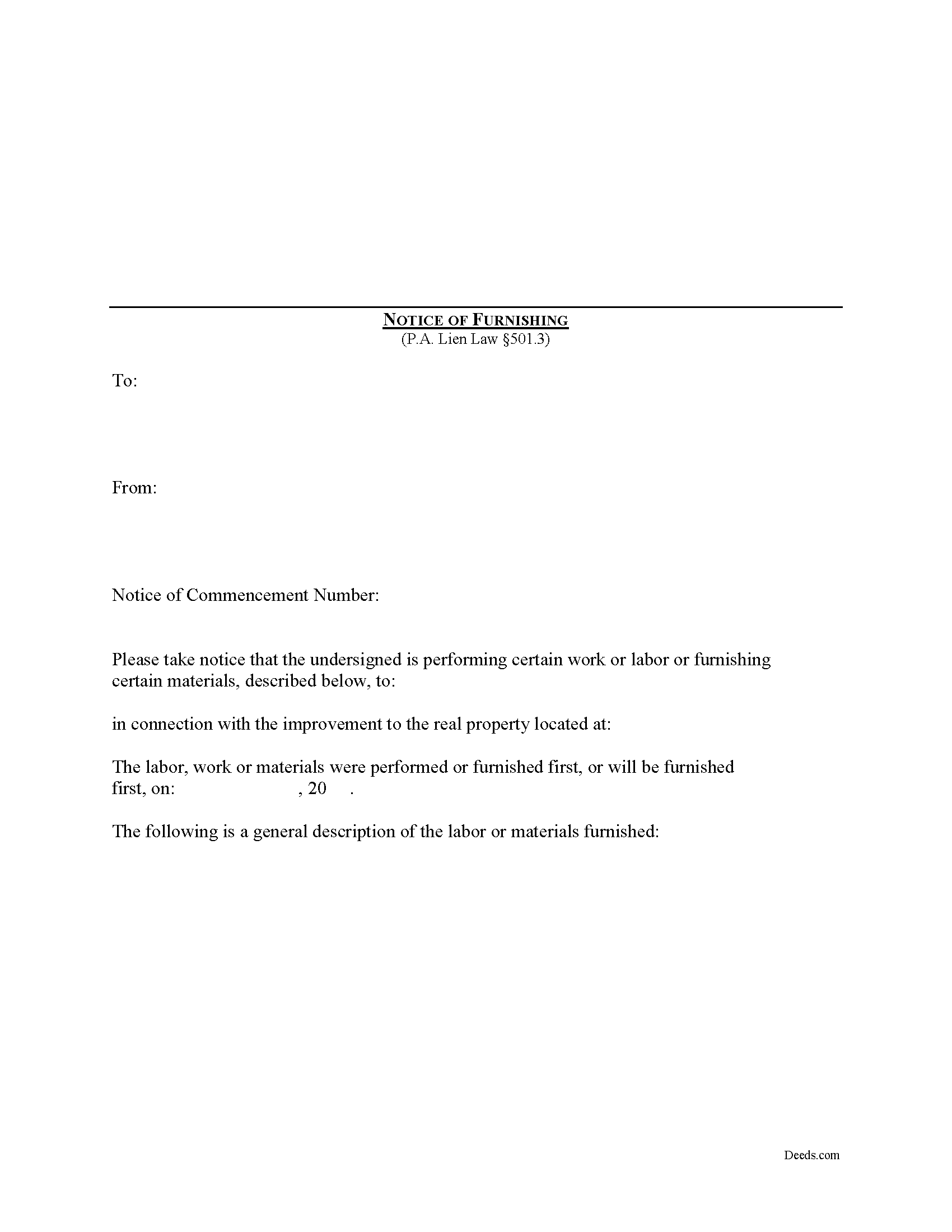
What is a Notice of Furnishing in Pennsylvania?
Mechanic's Liens are governed by Title 49 of the Pennsylvania Consolidated Statutes.
The Notice of Furnishing is a document providing notice to the owner that the start of labor or delivery of materials has commenced. The notice must be filed with the registry within forty-five (45) days of first furnishing labor or materials on a construction project. The Notice must also be served by certified mail on the owner within that time. If the Notice is served too late, you may still file a mechanic's lien but that lien will only include the unpaid services within 45 days of service and thereafter. 501.3.
The notice must contain the following: (1) a general description of the labor or materials furnished; (2) the full name and address of the person supplying the services or items; (3) the full name and address of the person that contracted for the services or items; and (4) a description sufficient to identify the searchable project, based on the description in the Notice of Commencement. 501.3(b)(3). In addition, the document must meet all state and local standards for recorded documents.
This article on the Pennsylvania Notice... More Information about the Pennsylvania Notice of Furnishing
Subcontractor Preliminary Notice
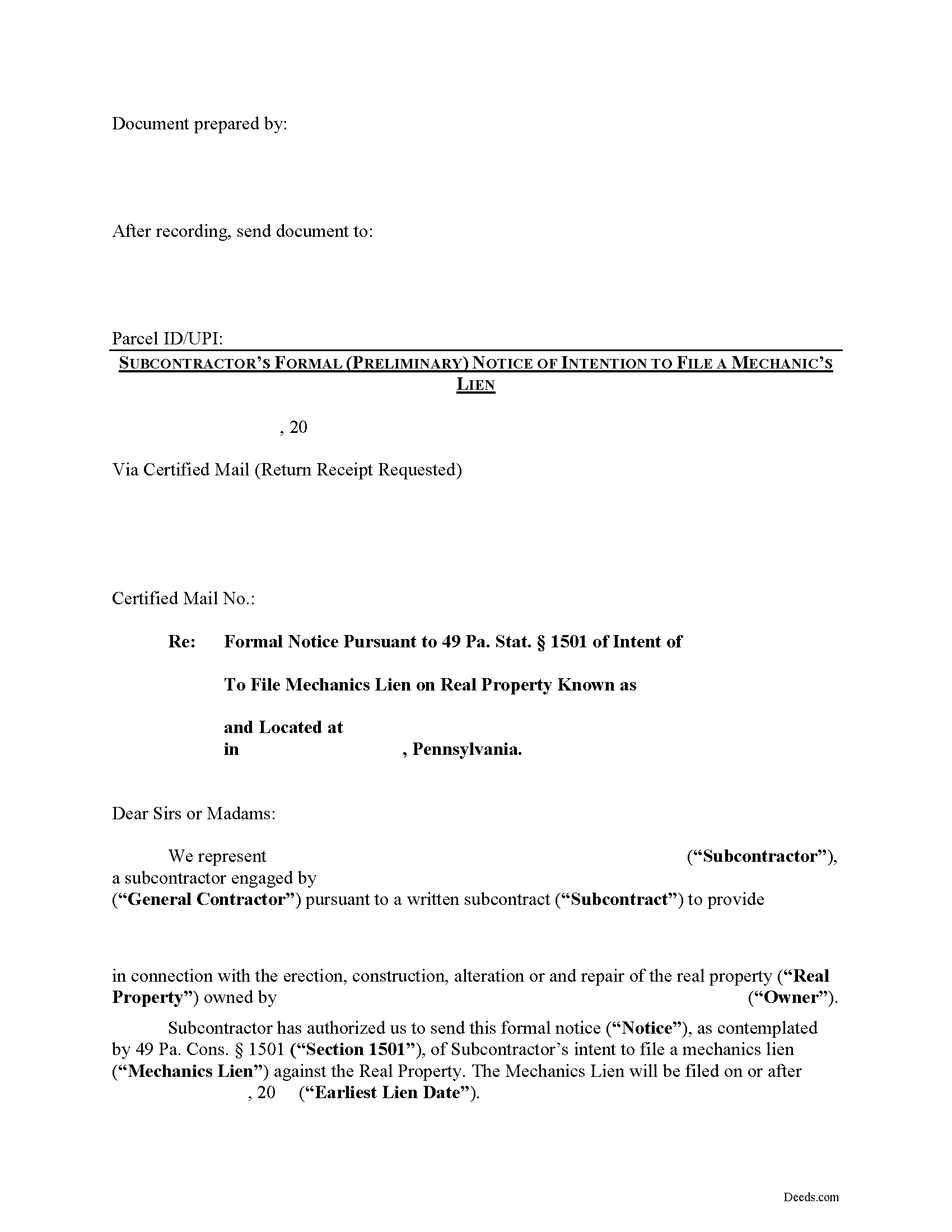
Pennsylvania Preliminary Notice Requirements for Subcontractors
Mechanic's Liens are governed by Title 49 of the Pennsylvania Consolidated Statutes.
Preliminary notice by subcontractors is a required step to obtaining any lien. Notice also provides the owner with information regarding who is working on the property and to what extent they may claim a lien.
As with most other states, the mechanic's lien law in Pennsylvania requires subcontractors to serve preliminary notice on the property owner or general contractor unless the parties are under a direct contract. According to Section 501, no claim by a subcontractor, whether for erection or construction or for alterations or repairs, shall be valid unless, at least thirty (30) days before the filing, he shall have given to the owner a formal written notice of his intention to file a claim. 49 P.S. 501(c). The formal notice must state: (1) the name of the party claimant; (2) the name of the person with whom he contracted; (3) the amount claimed to be due; (4) the general nature and character of the labor or materials furnished; (5) the date of completion of the work for which his claim is made; (6) a brief description suff... More Information about the Pennsylvania Subcontractor Preliminary Notice
Claim of Mechanics Lien
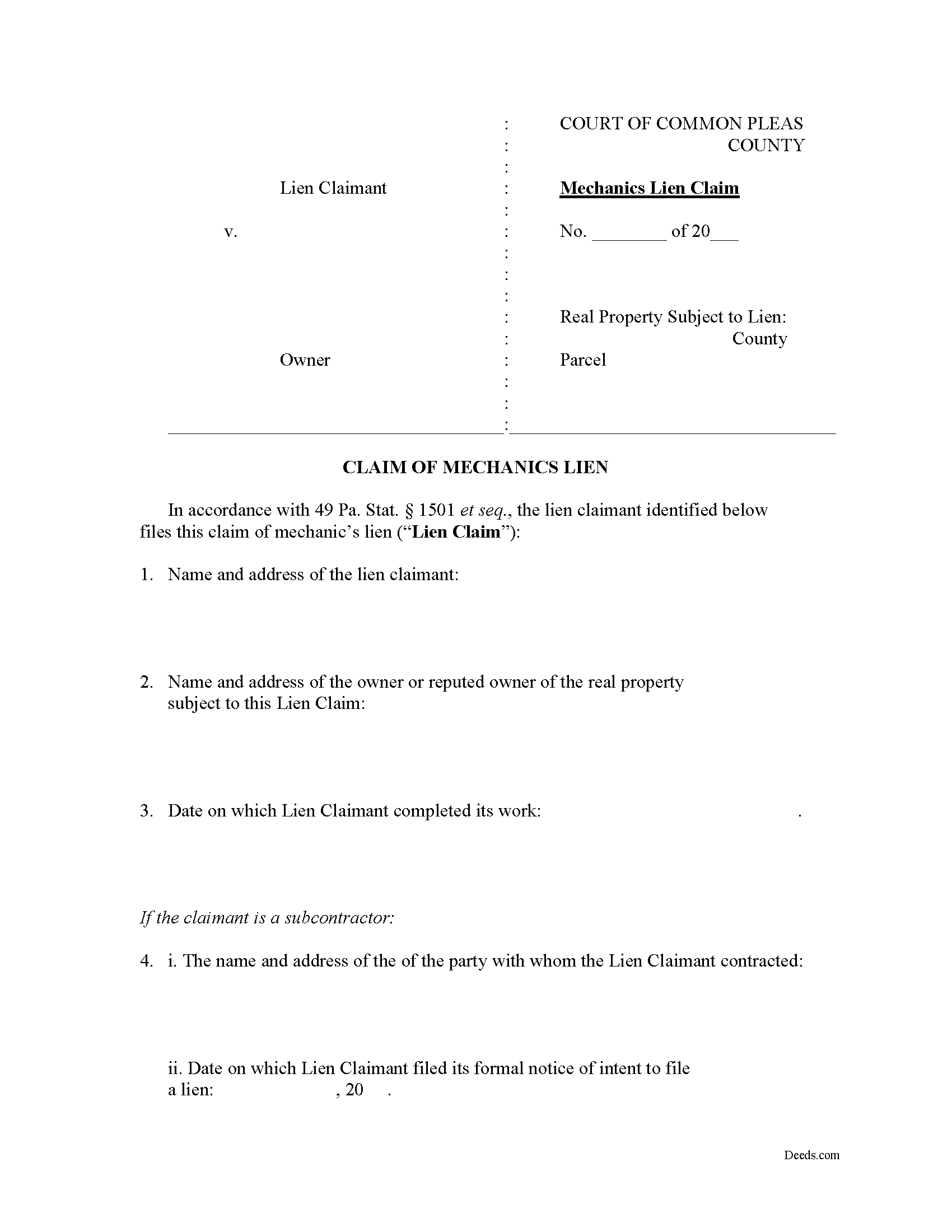
Obtaining a mechanic's lien in Pennsylvania
Mechanic's Liens are governed by Title 49 of the Pennsylvania Consolidated Statutes.
A mechanic's lien is a type of security interest used to guarantee payment for work completed or materials delivered in connection with a construction contract. You might be familiar with other types of liens such as a judgment lien or tax lien. A mechanic's lien works the same way by attaching itself to the title (ownership) interest of the property and making it difficult for the owner to sell or refinance without first resolving the lien. Therefore, it's a powerful tool when it's used properly.
In Pennsylvania, the procedure for obtaining and enforcing a mechanic's lien is governed under the Mechanic's Lien Law of 1963 (49 P.S. 1101). Liens are available to general contractors, subcontractors, laborers, and material or equipment suppliers who meet the requirements for filing including sending the necessary notices of commencement and furnishing as well as the preliminary (pre-lien) notice.
A lien can be claimed for unpaid labor or materials provided for the construction, alteration, or repair that exceeds a value of $500.00 (301). The lien... More Information about the Pennsylvania Claim of Mechanics Lien
Notice to Contractor
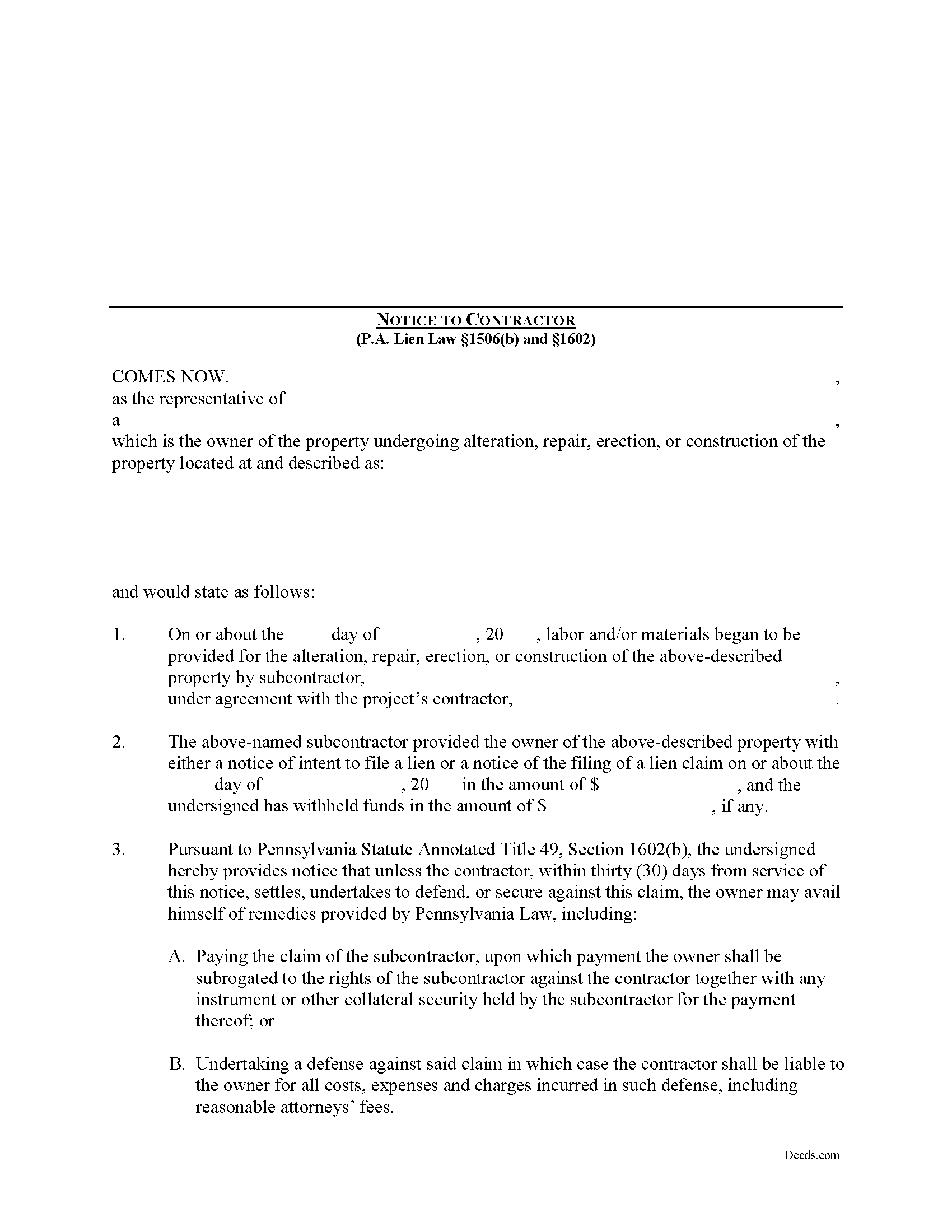
In Pennsylvania, the Notice to Contractor is used by property owners to defend against lien claims. The notice is especially useful when dealing with lien claims filed by a subcontractor working under a general contractor, because the owner may have no knowledge of their agreements.
Where a lien claim is filed by a subcontractor, the owner may give a written notice thereof to the contractor in the manner, and upon the giving of such notice the owner may avail himself of the remedies provided under the law. 49 P.S. 1506(b).
When the notice is served on the contractor, the undersigned is providing notice that unless the contractor, within thirty (30) days from service of the notice, settles, undertakes to defend, or secures against this claim, the owner may avail himself of remedies provided by Pennsylvania Law, including: 1) Paying the claim of the subcontractor, upon which payment the owner shall be subrogated to the rights of the subcontractor against the contractor together with any instrument or other collateral security held by the subcontractor for the payment thereof; or 2) Undertaking a defense against said claim in which case the contractor shall be liable to the owne... More Information about the Pennsylvania Notice to Contractor
Assignment of Lien
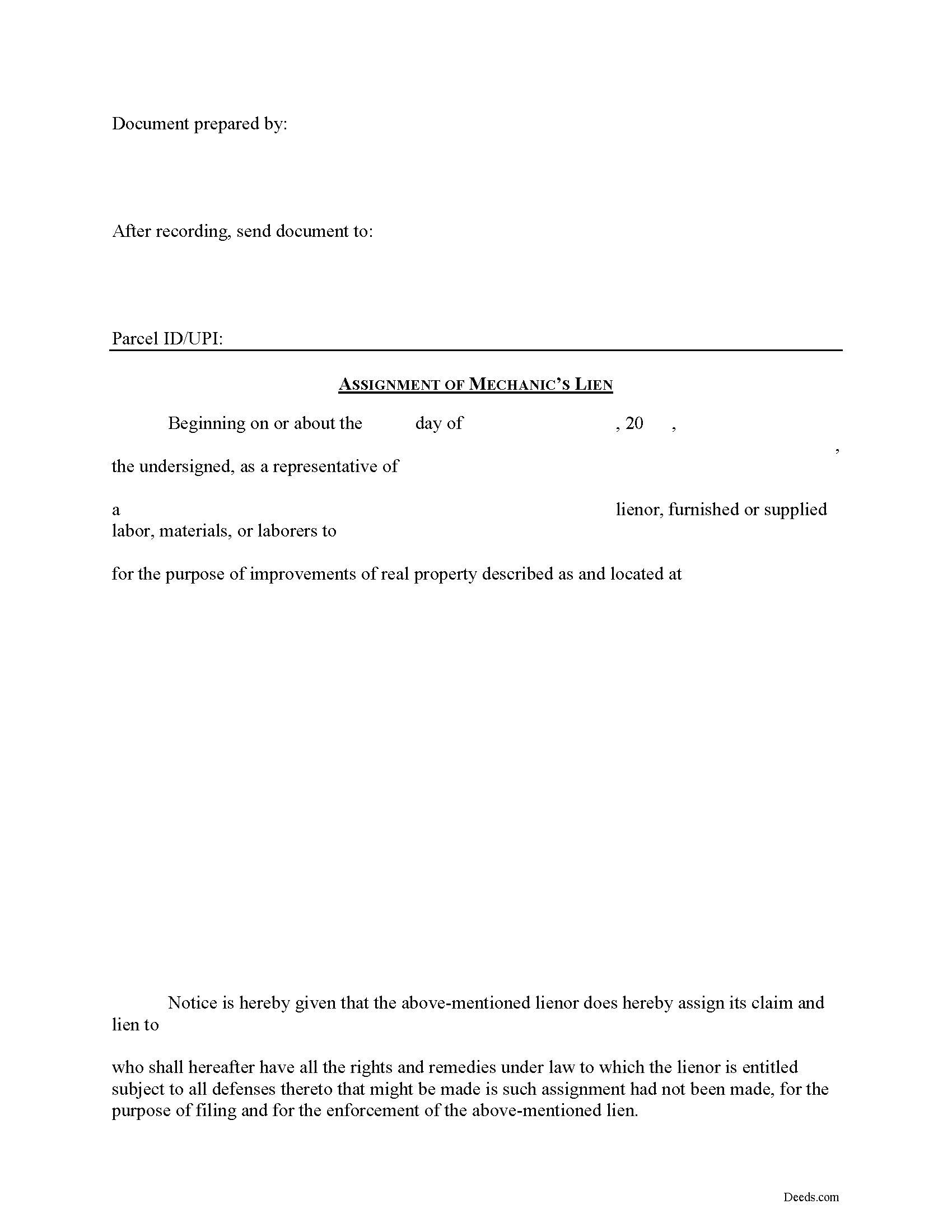
Mechanic's Lien assignments can be accomplished by filing an assignment of lien document with the county recorder or prothonotary office where the subject property is located and where the lien was originally recorded.
One of the fundamental principles of contract law is the right to assign contract rights to a third party. For example, Bill contracts with Ted to build a house for Ted. Bill then assigns the right to payment for the house to Fred (maybe he owes Fred some money on a debt). This is called an "assignment." With the basic legal terminology clarified, let's move on to how lien assignments work in Pennsylvania.
Typically, under the rule on assignments, all rights of either seller or buyer can be assigned except where the assignment would materially change the duty of the other party, or increase materially the burden or risk imposed on the other party by the contract, or impair materially the other party's chance of obtaining return performance. In general, as long as there is no increased burden or risk, or the duties required by the party subject to the lien somehow change, an assignment is permissible.
A valid assignment identifies the parties, the subject pro... More Information about the Pennsylvania Assignment of Lien
Satisfaction of Lien
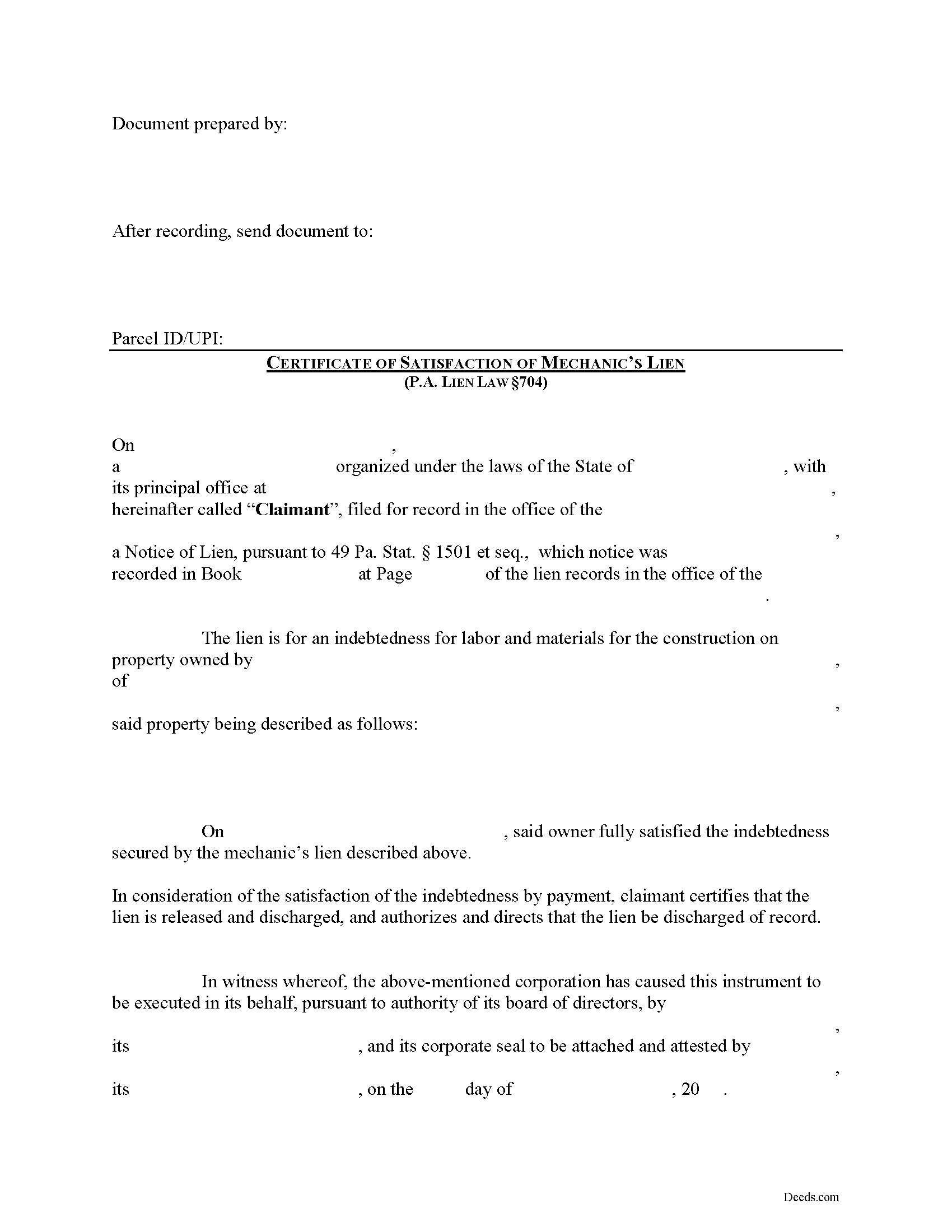
Filing Satisfaction of a Mechanic's Lien Claim in Pennsylvania
Satisfactions of a Lien Claim are used when a lien claim has been fully paid and satisfied and then underlying lien is no longer necessary. Upon lien satisfaction, the lien claimant is tasked with releasing the lien or face possible civil penalty for failing to do so.
Upon payment, satisfaction or other discharge of the claim, verdict or judgment to the claimant must enter satisfaction thereof upon the record upon payment of the costs of same. 49 P.S. 704.
If the claimant fails to file the satisfaction within thirty (30) days after a written request to satisfy, the court, upon petition of any party in interest, may order the claim, verdict or judgment satisfied and the claimant shall be subject to a penalty in favor of the party aggrieved in such sum as the court in the petition proceedings shall determine to be just, but not exceeding the amount of claim. Id.
A valid satisfaction of lien identifies the parties, the property where the work or improvement took place, recording information for the filed lien, relevant dates, and any other details necessary for the situation. In addition, the form must meet all... More Information about the Pennsylvania Satisfaction of Lien
Conditional Lien Waiver on Progress Payment
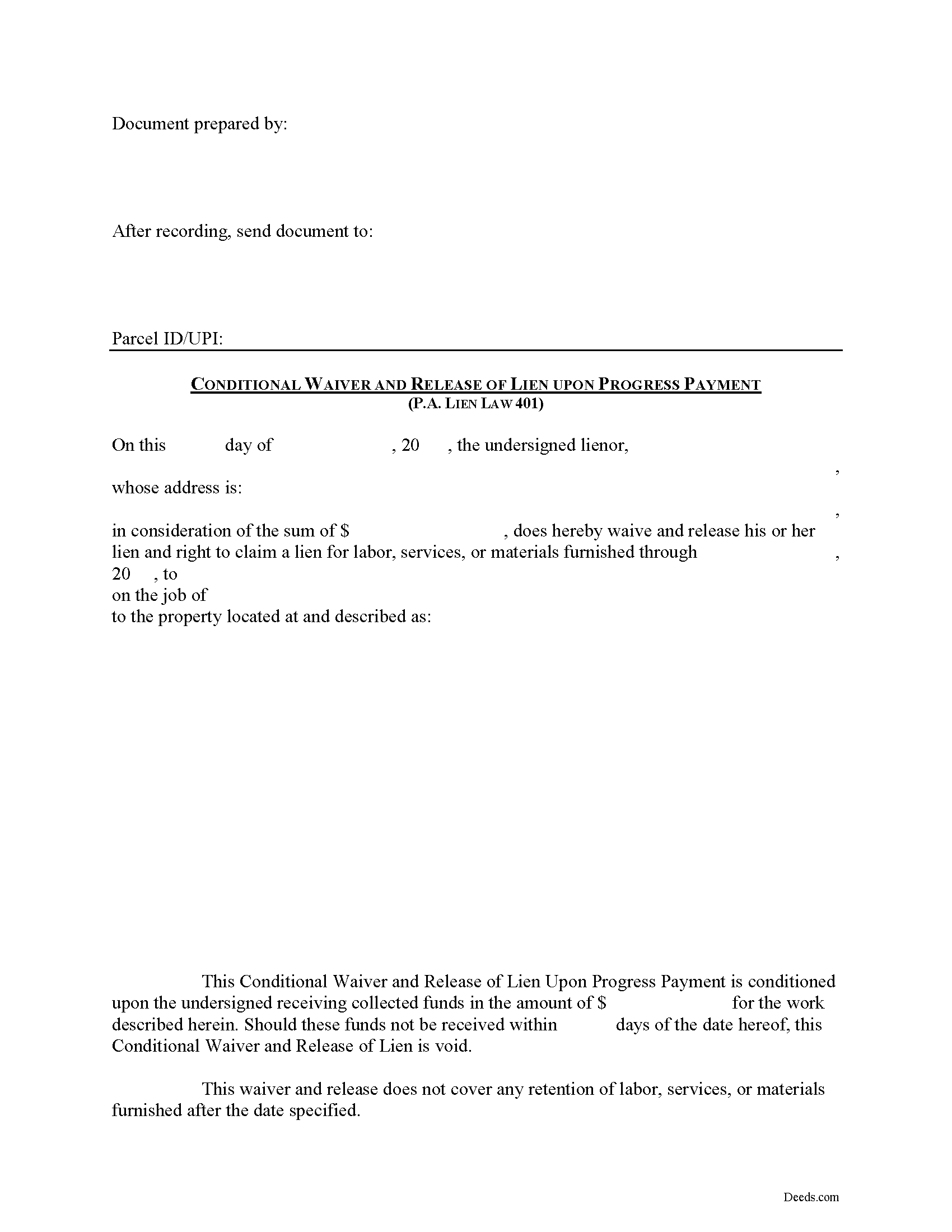
In Pennsylvania, a contractor or subcontractor may waive his right to file a claim against residential property by a written instrument signed by him or by any conduct which operates equitably to estop such contractor from filing a claim. 49 P.S. 401(a).
Contractors use lien waivers to forfeit or give up their right to claim a mechanic's lien. Usually, the purpose of a waiver is to alleviate concerns by a property owner or other contractor that a lien will be levied on the property. In return for waiving lien rights, the owner or other party makes a full or partial payment. The type of waiver used depends on the type of payment made.
Use a conditional waiver when payment hasn't been made at the time of the waiver or the payment method takes time to clear (such as a check or bank draft). Unconditional waivers are appropriate when a full or final payment has been made and evidence of the payment can be verified. Within each of these two categories, waivers can be granted for a full payment or a partial (or progress) payment.
A waiver by a contractor of lien rights is against public policy, unlawful and void unless given in consideration for payment for the work, services, ma... More Information about the Pennsylvania Conditional Lien Waiver on Progress Payment
Unconditional Lien Waiver on Progress Payment
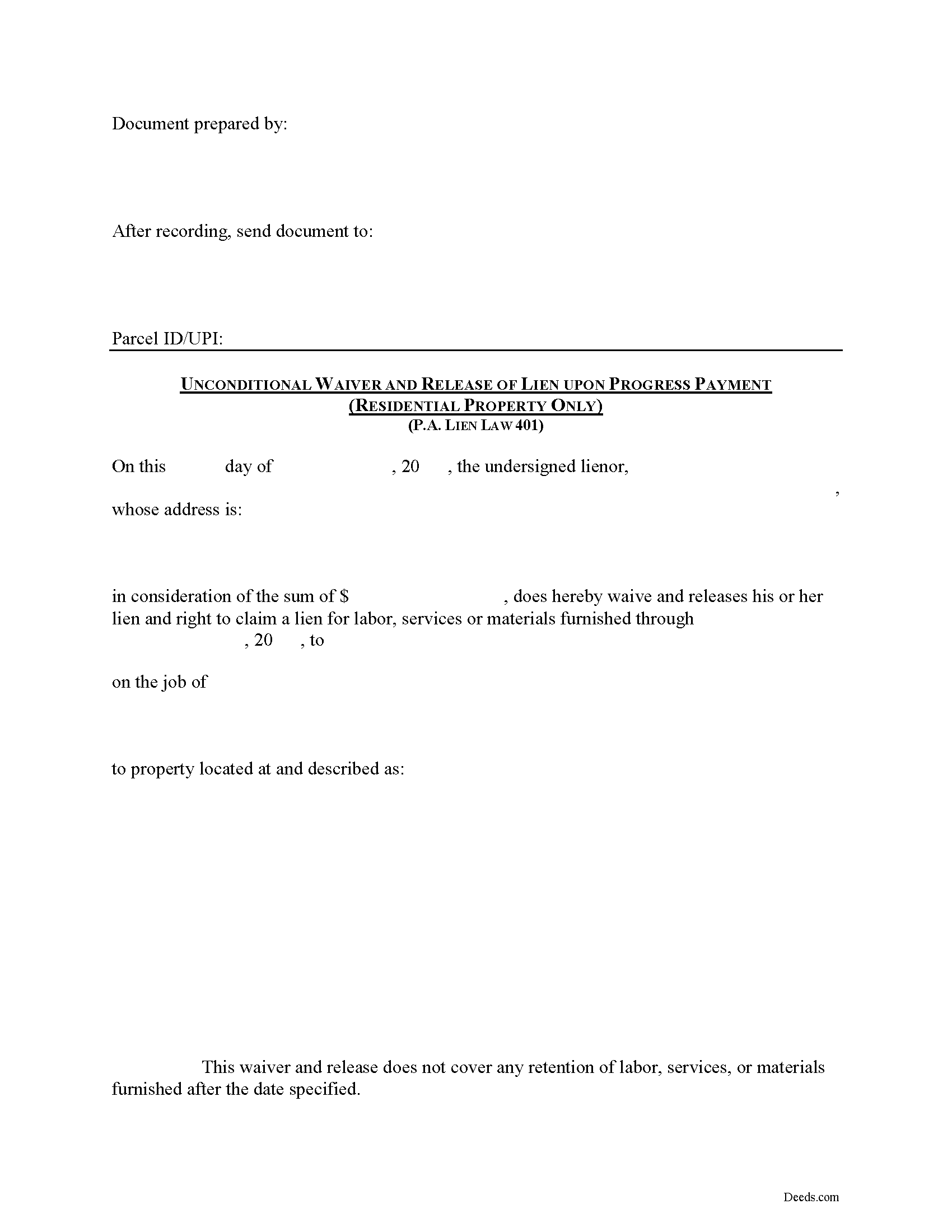
In Pennsylvania, a contractor or subcontractor may waive his right to file a claim against residential property by a written instrument signed by him or by any conduct which operates equitably to estop such contractor from filing a claim. 49 P.S. 401(a).
Contractors use lien waivers to forfeit or give up their right to claim a mechanic's lien. Usually, the purpose of a waiver is to alleviate concerns by a property owner or other contractor that a lien will be levied on the property. In return for waiving lien rights, the owner or other party makes a full or partial payment. The type of waiver used depends on the type of payment made.
Use a conditional waiver when payment hasn't been made at the time of the waiver or the payment method takes time to clear (such as a check or bank draft). Unconditional waivers are appropriate when a full or final payment has been made and evidence of the payment can be verified. Within each of these two categories, waivers can be granted for a full payment or a partial (or progress) payment.
In regard to subcontractors, a waiver by a subcontractor of lien rights is against public policy, unlawful and void, unless given in consideration for p... More Information about the Pennsylvania Unconditional Lien Waiver on Progress Payment
Conditional Lien Waiver on Final Payment
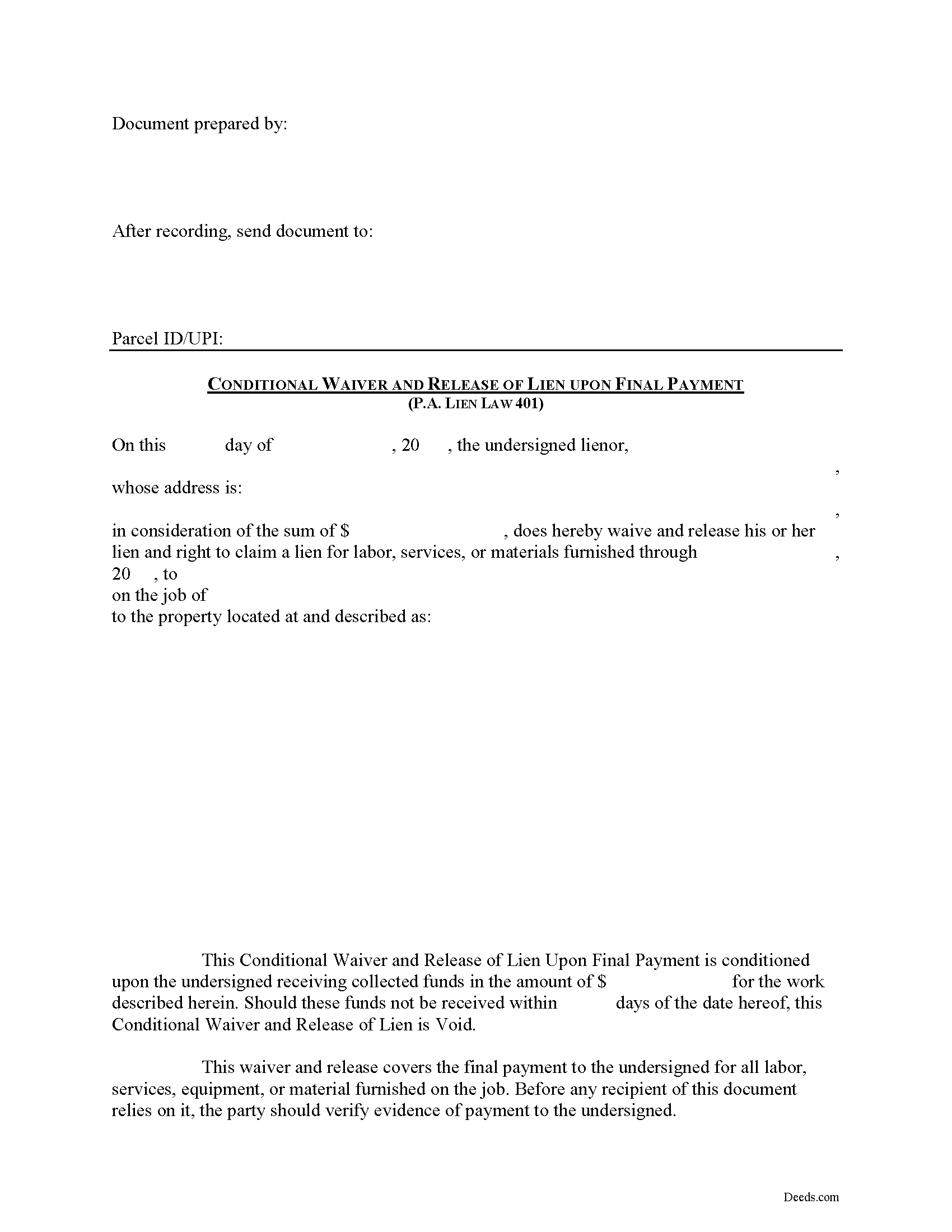
In Pennsylvania, a contractor or subcontractor may waive his right to file a claim against residential property by a written instrument signed by him or by any conduct which operates equitably to estop such contractor from filing a claim. 49 P.S. 401(a).
Contractors use lien waivers to forfeit or give up their right to claim a mechanic's lien. Usually, the purpose of a waiver is to alleviate concerns by a property owner or other contractor that a lien will be levied on the property. In return for waiving lien rights, the owner or other party makes a full or partial payment. The type of waiver used depends on the type of payment made.
Use a conditional waiver when payment hasn't been made at the time of the waiver or the payment method takes time to clear (such as a check or bank draft). Unconditional waivers are appropriate when a full or final payment has been made and evidence of the payment can be verified. Within each of these two categories, waivers can be granted for a full payment or a partial (or progress) payment.
A waiver by a contractor of lien rights is against public policy, unlawful and void unless given in consideration for payment for the work, services, ma... More Information about the Pennsylvania Conditional Lien Waiver on Final Payment
Unconditional Lien Waiver on Final Payment
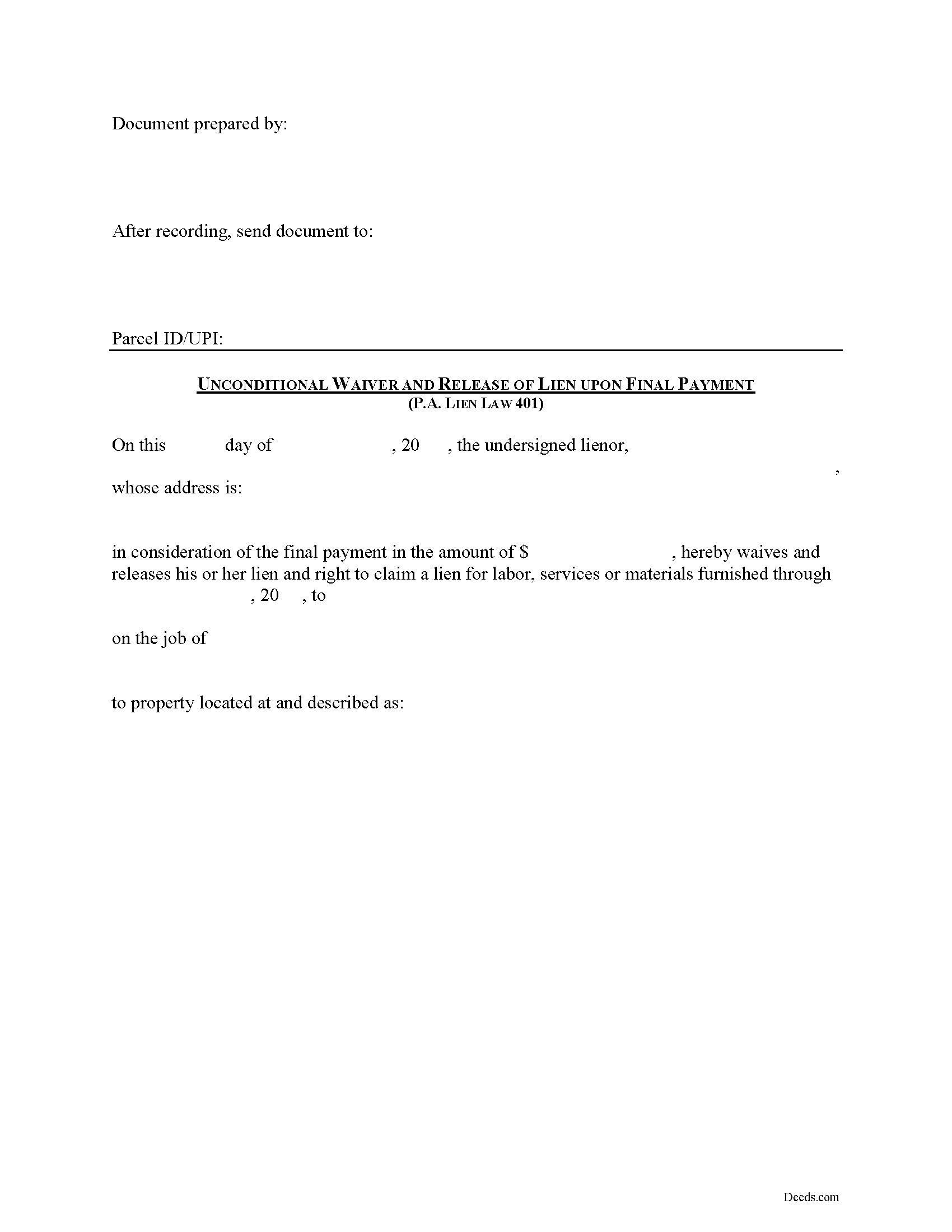
In Pennsylvania, a contractor or subcontractor may waive his right to file a claim against residential property by a written instrument signed by him or by any conduct which operates equitably to estop such contractor from filing a claim. 49 P.S. 401(a).
Contractors use lien waivers to forfeit or give up their right to claim a mechanic's lien. Usually, the purpose of a waiver is to alleviate concerns by a property owner or other contractor that a lien will be levied on the property. In return for waiving lien rights, the owner or other party makes a full or partial payment. The type of waiver used depends on the type of payment made.
Use a conditional waiver when payment hasn't been made at the time of the waiver or the payment method takes time to clear (such as a check or bank draft). Unconditional waivers are appropriate when a full or final payment has been made and evidence of the payment can be verified. Within each of these two categories, waivers can be granted for a full payment or a partial (or progress) payment.
In regard to subcontractors, a waiver by a subcontractor of lien rights is against public policy, unlawful and void, unless given in consideration for p... More Information about the Pennsylvania Unconditional Lien Waiver on Final Payment
Disclaimer of Interest
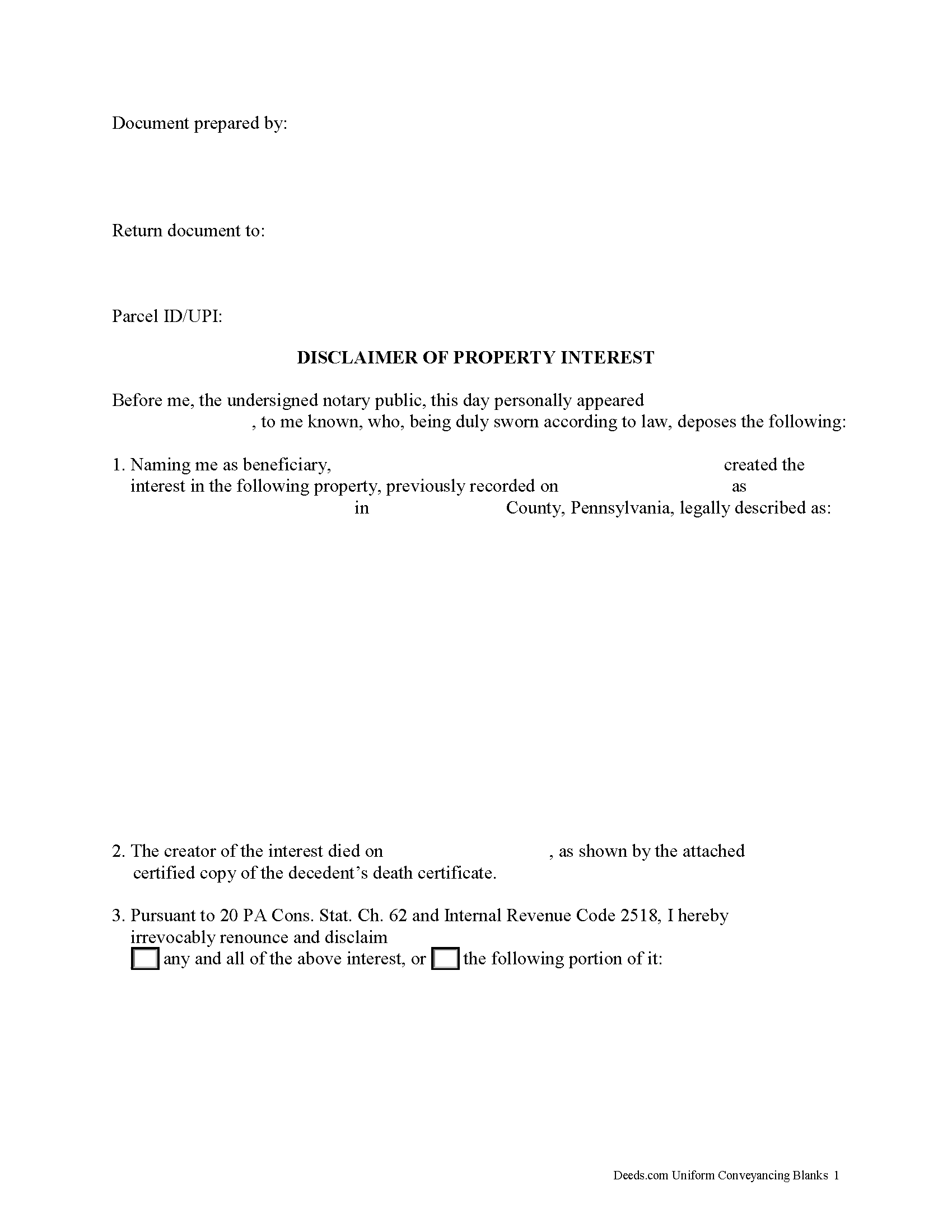
A beneficiary of an interest in property in Pennsylvania can disclaim all or part of a bequeathed interest in, or power over, that property under 20 PA Stat. Cons. Ch. 62. This document must be in writing, declared a disclaimer, signed by the disclaimant or a legally authorized representative, and describe the disclaimed property or portion of it ( 6201).
The disclaimer must be delivered to the transferor, donor or representative, trustee or person who has legal title. In the case of an interest passing by death, an executed counterpart may be filed with the clerk of the court in the county where the estate is or will be administered. If it pertains to real property, it may also be recorded with office of the recorder in the county where the property is situated ( 6204).
Even though the Pennsylvania statutes stipulate no time limit to the delivery, the disclaimer must be received no later than 9 months after the transfer is made (e.g. date of death) in order to comply with IRS regulations. In addition, the disclaimer is invalid if the disclaimant has accepted the property, i.e., performed any affirmative act that is consistent with ownership of property, such as acceptance... More Information about the Pennsylvania Disclaimer of Interest
Certificate of Trust
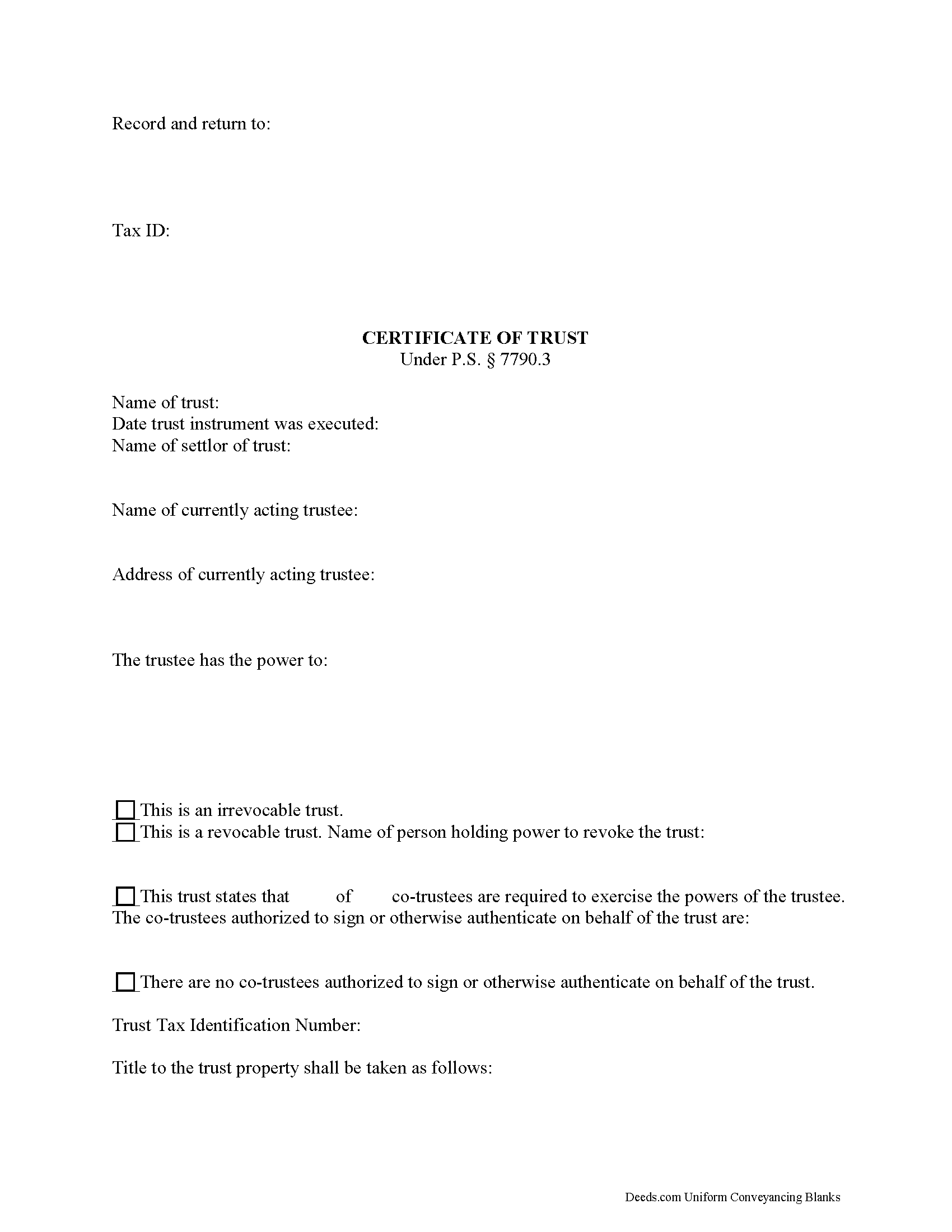
Find the laws regarding certificates of trust at section 7790.3 of the Pennsylvania Statutes.
A trustee is a person or entity who holds title to a trust's assets on behalf of a settlor. Trustees use an official document called a certificate of trust to validate the trust's existence and confirm their authority to act on its behalf.
In order to facilitate transactions dealing with real property in a trust, lenders may require the trustee to furnish a certificate of trust. Third parties may also request a certificate to confirm the trustee has the authority, for example, to transfer real property out of the trust and to them.
The certificate presents essential information about the (unrecorded) full trust instrument, while protecting the confidentiality of its specific details. A recipient of a certificate may still request copies of certain sections of the trust instrument, particularly those establishing the appointment of a trustee and the trustee's powers, as well as amendments to the trust, but the request opens up certain liabilities, as enumerated in P.S. 7790.3(e),(h).
Section 7790.3 governs the contents and effect of the certificate. Requirements of the certific... More Information about the Pennsylvania Certificate of Trust